
























10.30–12.30PM, THU 20 NOV 2025

This is your exclusive golden ticket to the datadriven insights that will transform how you view the management rights market.
Picture this: you, a perfectly brewed coffee in hand, surrounded by industry experts who are ready to spill the secrets that will elevate your business to the next level. This isn’t just another morning tea—it’s your competitive advantage served fresh!
Here’s what’s waiting for you:
EXCLUSIVE FIRST LOOK
Be the first to preview the highly anticipated fourth edition of the annual Management Rights Report before it goes public. Knowledge is power, and you’ll have it first!
FREE EXPERT LEGAL ADVICE
Get insider tips from a specialist management rights lawyer on navigating sellers’ disclosure. No strings attached, just pure expertise!
TRIPLE MARKET INTELLIGENCE
Dive into three dynamic market snapshots covering Brisbane, Gold Coast, and Sunshine Coast activity. Know your markets like never before!
Register today and get ready to master your market!









The views and images expressed in Resort News do not necessarily refl ect the views of the publisher. The information contained in Resort News is intended to act as a guide only, the publisher, authors and editors expressly disclaim all liability for the results of action taken or not taken on the basis of information contained herein. We recommend professional advice is sought before making important business decisions.
The publisher reserves the right to refuse to publish or to republish without any explanation for such action. The publisher, its employees and agents will endeavour to place and reproduce advertisements as requested but takes no responsibility for omission, delay, error in transmission, production defi ciency, alteration of misplacement. The advertiser must notify the publisher of any errors as soon as they appear, otherwise the publisher accepts no responsibility for republishing such advertisements. If advertising copy does not arrive by the copy deadline the publisher reserves the right to repeat existing material.
Any mention of a product, service or supplier in editorial is not indicative of any endorsement by the author, editor or publisher. Although the publisher, editor and authors do all they can to ensure accuracy in all editorial content, readers are advised to fact check for themselves, any opinion or statement made by a reporter, editor, columnist, contributor, interviewee, supplier or any other entity involved before making judgements or decisions based on the materials contained herein.
Resort News, its publisher, editor and staff, is not responsible for and does not accept liability for any damages, defamation or other consequences (including but not limited to revenue and/ or profi t loss) claimed to have occurred as the result of anything contained within this publication, to the extent permitt ed by law.





Advertisers and Advertising Agents warrant to the publisher that any advertising material placed is in no way an infringement of any copyright or other right and does not breach confi dence, is not defamatory, libellous or unlawful, does not slander title, does not contain anything obscene or indecent and does not infringe the Consumer Guarantees Act or other laws, regulations or statutes. Moreover, advertisers or advertising agents agree to indemnify the publisher and its agents against any claims, demands, proceedings, damages, costs including legal costs or other costs or expenses properly incurred, penalties, judgements, occasioned to the publisher in consequence of any breach of the above warranties. It is an infringement of copyright to reproduce in any way all or part of this publication without the writt en consent of the publisher.
On my recent travels, I was reminded just how powerful tourism is for local economies. One busy weekend at a seaside resort can light up a whole town, with cafés humming, shops busy and local jobs ticking over. Even a few extra midweek bookings at a country motel can make a real difference for small businesses and community life. The latest figures tell the same story, showing that regional escapes continue to play a crucial role in domestic tourism spend. This is where management rights truly shine. In beachside resorts and regional apartment complexes, the resident manager is often the glue that holds everything together, welcoming guests,



















Mandy Clarke, Editor editor@resortnews.com.au
maintaining facilities, supporting owners and ensuring the business not only survives but thrives. These managers are not just looking after properties; they are keeping the heartbeat of local tourism strong.
Our sector is no stranger to challenges, with regulatory and political decisions having a direct impact on how we operate. When



the future of management and letting rights (MLR) businesses can be shaped by policymakers who do not fully understand the value this model brings to communities and economies, it highlights just how important awareness and education are. We need to keep telling our story, not only within the industry but also to government and regulators.
The ARAMA TOP Awards in Brisbane captured this message perfectly. With Premier David Crisafulli lending his support, the event reinforced the value of recognition at the highest levels. It was a celebration and also a powerful reminder of the professionalism and resilience that give our industry credibility when we advocate for ourselves.
I felt that same energy at NoVacancy 2025 in Sydney, where I caught up with ARAMA CEO Trevor Rawnsley and many others proudly flying the flag for management rights. The conversations were
inspiring and underscored the need to keep educating everyone, from government to guests, about what we do and why it matters.
This edition is especially meaningful. It marks the 350th issue of Resort News. It is a remarkable milestone for our small team, and what an honour it is for me to be the custodian of this publication. Resort News has always been about telling the real stories of this industry— stories that educate, connect and advocate for management rights. Through our sister title AccomNews, we can also champion this sector more broadly, ensuring the value of MLR is heard well beyond our own community.
Thank you for being part of this journey. Together, let’s keep telling the stories, raising awareness and building understanding of why management rights matter.
Warm regards, Mandy Clarke, Editor, Resort News




Australia’s foremost management rights sales agency, with 15 years of expertise and a dynamic team of over 15 agents strategically positioned along the vibrant expanse of the east coast, we bring unparalleled expertise and dedication to every client interaction. mrsales.com.au | 1300 928 556



National coverage and expertise in the sale of motels, hotels, caravan parks, pubs & MHEs tourismbrokers.com.au | 1300 512 566










By Trevor Rawnsley, CEO, ARAMA
It was the greatest night in the history of management and letting rights (MLR).



The 2025 TOP Awards at The Star Casino Events Centre in Brisbane was a magnificent gala event showcasing the very best of our industry—its leading professionals, its underlying strength and resilience, and the popularity of our members who go above and beyond to provide outstanding service for owners, tenants and guests.
Everyone on the night was thrilled by the ringing endorsement for our industry shown by the attendance of Queensland Premier David Crisafulli.
The Premier has been a strong supporter of our industry and the TOP Awards since he attended the first one at City Tattersalls in Brisbane in 2019 when he was the shadow tourism minister. He also came to the following TOP Awards at Victoria Park Golf Club, which is now going to be the site of our shiny new Olympic stadium.
The fact that the Premier has now been to our TOP Awards several times is further acknowledgement of the importance of what our members do for
the tourism and business sectors wherever management and lett ing rights operate.
We also hosted Federal Government representation on the night with the attendance of Leon Rebello, the Member for McPherson which covers much of the Gold Coast. And we were delighted that Hermann Vorster, the State Member for Burleigh, joined us as well, representing the Queensland Attorney-General, the major lawmaker in Queensland.

The 2025 TOP Awards were a tribute to the diligence, determination and great service provided by our TOP operators, professionals, suppliers and service providers. It was the biggest attendance we’ve had for the awards with 338 guests having a ball, and it was such a convivial event, a great mix between the high-grade professionalism of the presentation and the intimacy of guests mingling throughout.
There was a high level of production value at the venue that made the night special, but what made it even more special was the quality of the people there—all 338 of them celebrating what makes our industry so great.
Our MC, Kimberley Busteed, a Channel 7 personality and former Miss Universe Australia, did an outstanding job, and I was so impressed that throughout the night the audience was respectful, listening

attentively to everyone on the stage and applauding at all the right moments.
There were a number of people in the room, operators and managers, who hadn’t been to an awards night before, and it was pleasing that their first experience was so memorable, with one manager telling me, “We're blown away by how big the event is; how important it is.”
There is a real gravitas to the awards now with a rigorous judging process. Our judging panel is drawn from our cohort of Life Members who understand our industry and the importance of giving back. It is truly a peer-based awards process. They are not just awards for mum and dad operators, but major corporations also vie for them including Oaks, Sebel, ULTIQA, Peppers and, for the first time, Accor, the world’s biggest management rights operator. For some of our managers to win an award against the likes of Oaks and Accor is an incredible accomplishment and just shows the professionalism of the winning managers.
The awards were individually sponsored by some of our great supporters. The TOP Awards are split into two broad segments
And so,
and the night had two major naming rights sponsors.
The Merit Awards, which are subject to a demanding judging process, were sponsored by EBM Insurance and Risk.
The People's Choice Awards, which are determined by a combination of popular vote and membership referrals to ARAMA, were sponsored by The Onsite Manager.
The 2025 TOP Awards honoured the very best of the best in our business, and the work displayed by all of our winners, finalists and nominees can only inspire everyone involved in MLR.
We all work in a service industry and those who reached the peak of the TOP Awards show what can be achieved by going that extra mile to provide award-winning service.
Sponsored by: Flood Legal
Winner: Brian Whitehead, Mantra Southport Central, Gold Coast.
A record number of 12 nominations in this category, including three previous TOP Award winners, really put this judge to work.
The judge commented: “There were many outstanding candidates for Building Manager of the Year, but Brian really stood out for his unwavering commitment to his team, his passion for the building and the industry, and his innovative, outside-the-box approach.
“Managing a property of this scale, with three towers, 789 apartments and over 2000 residents, requires exceptional operational expertise, professionalism and patience. Brian
Sponsored by: MYBOS
Winner: Sue Fairweather and the team at ULTIQA Freshwater Point Resort, Gold Coast.
This is the category that attracts the big guns. Some of Australia's biggest and best building management teams nominated here. Well-known operators such as Mantra, Sebel, ULTIQA, Oaks, Stayco and Peppers all featured prominently.
The judge commented: “The winner of this year’s award
exemplified excellence in building management through its cohesive high-performing team that delivers exceptional service across multiple properties.
“The outstanding performance demonstrated by this year’s winner was not just in operational efficiency, but the human element –genuine care for their communities, commitment to sustainability, and the ability to nurture positive, long-term relationships with stakeholders. It’s the Triangle of Management in action.”
Sponsored by:
EBM Insurance and Risk
consistently demonstrated all of these qualities to win the award.
His cost-saving initiatives have delivered over $800,000 in savings, including a lighting upgrade that now saves more than $80,000 per year in energy costs. Most impressively, when the building’s main water pipe system failed, Brian worked with hydraulic engineers and fire safety professionals to create a temporary solution that prevented the evacuation of thousands of residents and saved the committee $1.3 million in emergency costs.”
As one committee member put it:
“In a role that is often demanding and underappreciated, our Building Manager stands out as someone who not only rises to the challenge but exceeds it.”
Outstanding work, Brian.
Winner: Hamish and Jess Watts, Glen Eden Beach Resort, Sunshine Coast.
This was another hotly contested field featuring two previous TOP Award winners among the nominees. Once again, the task of choosing one over the others was difficult – all the nominees appeared to be worthy recipients.
The judge remarked: “In 2025 we have a large number of community title schemes which are ageing and as such, several pieces of infrastructure and numerous facilities require maintenance and/ or replacement. These matters are expensive and of course require agreement among owners, which is not always an easy task.
“The work achieved by Hamish and Jess had been outstanding and
worthy of recognition. Their ability to garner support from a mixed-use ownership group and commitment to environmental matters was testament to their work ethic and skill set.”
Last year, Hamish and Jess took out the TOP Award for Resort Management Team of the Year after saving their complex more than $600,000 in a driveway project. As a result, they received a glowing endorsement from their strata treasurer and body corporate manager.
“The initial budget for the driveway renovation was $750,000. Through Hamish’s dogged persistence in finding tradespeople who would do the right work at the right price, all the work was carried out for $120,000. That’s what you call a TOP performance and a brilliant example of the benefits of MLR to a scheme and to the entire industry.”
commitment that these nominees demonstrated, we would have a much stronger and dispute-free industry.”
Sponsored by: Property Bridge
Winner: Michael and Roslyn Rudd, Cloudland Apartments, Brisbane.
This category was hotly contested, with nominees including a Gold Medal winner in the Queensland Tourism Awards, a Silver Medal winner in the Australian Tourism Awards, a two-time ARAMA TOP Awards winner and last year’s TOP Awards winner.
The judge of the award said: “This was an incredibly difficult task as all nominees were clearly amazing managers. If everyone in the industry showed the initiative, dedication and
There was so little difference between each nominee in all aspects that the judge would have given the award to every one of them. However, there can only be one winner, and Paul and Francine excelled in the areas of innovation, building presentation, relationship building, guest satisfaction and financial returns for owners.
Paul and Francine also won a TOP Award in 2022, a mighty achievement since they only took over The Peninsula 12 months earlier in their first foray into MLR.
The judge said: “The quality of the submissions was very high and choosing a winner was quite difficult. What particularly stood out with the winning submission was Michael and Roslyn’s work over and above the traditional property management duties, in particular, creating a stronger sense of comfort and connection among their residents.
“They have been the driving force behind numerous community and social events such as Christmas parties, Easter and Australia Day events, games days and residents’
farewells at their scheme over many years, which has created a closer sense of community and belonging among the residents.
“Another feature which stood out in their submission was their over-and-above contribution during emergency events including major hailstorms and cyclones. Their tireless work for long hours into the night to support their residents during major emergency events has greatly reduced the impact on residents and reduced the damage, enabling a much quicker and better recovery.”
This has saved their scheme considerable amounts of money and reduced insurance claims.
Sponsored by: Programmed Property Services
Winner: Sue-Ellen Knox and the team at Bel Air on Broadbeach, Gold Coast.
There were 10 nominations in this category with last year’s winners all vying for the main prize. This made it hard work for the judge, who had to be particularly thorough in reviewing the submissions and examining social media review scores and marketing.
The judge remarked: “They were all very good applicants, but the winner’s achievements over the last year in substantially increasing their rental pool – and their efforts in looking after this complicated layered scheme consisting of five bodies corporate—was exceptional. They have clearly built a strong relationship with all the committees and owners and managed to keep their guests returning in record numbers.”
Awarded to: Tony Rossiter, Holmans Accounting and Taxation.
Tony has been an ARAMA member for more than 20 years, with his firm Holmans also acting as ARAMA’s financial controller on a voluntary basis for the last 15 years. He has made many significant contributions to ARAMA and the MLR industry generally. The board considers him a worthy addition to the Life Membership fraternity of ARAMA.
A significant increase in voting matched a rise in the number of nominees for the Merit Awards. This shows that the TOP Awards resonate with the industry and are recognised as an important part of the public relations and marketing mix for our members and ARAMA.

Sponsored by: The Onsite Manager
Winner: Chenoa Daniel, ResortBrokers.
Chenoa has represented ResortBrokers on the Sunshine
Coast since 2020, selling everything from small businesses worth a few hundred thousand dollars to major resorts worth eight-figure sums. This was her second award, having won Sales Broker of the Year in 2022 at Brisbane’s City Hall.
Sponsored by: MRM Finance
Winner: ResortBrokers.
Established 40 years ago by Ian Crooks, ResortBrokers continues to grow nationally with more than 30 brokers licensed in every state and territory. Since 2019, the business has been led by Managing Director Trudy Crooks, who has taken the agency to new heights. Ian’s son, Tim, and daughter Carla Cook, along with son-in-law Alex Cook, serve as directors alongside Trudy.
Sponsored by: ResortBrokers
Winner: Mahoneys Lawyers & Advisors.
Founding partner John Mahoney has more than 35 years’ experience in property and business and is a recognised expert in MLR. He has represented ARAMA and
The TOP Awards has always been a tremendous public relations event and a way to recognise and reward the people who create such positive stories for management rights.
the industry on every significant piece of legislation and was responsible for key parts of the framework in place today.
John was ARAMA Service Provider of the Year in 2019, 2020 and 2021, and in 2023 received a Lifetime of Service Award from ARAMA for his commitment to the industry.
Sponsored by: Archers the Strata Professionals
Winner: Don Brady.
Don has many years of industry
experience and is active in the sales of both going concerns and off-the-plan management rights properties. He also advises developers on viability.
This year we went to the next level in showcasing and rewarding the best performers in our industry, sharing inspiring stories about the dedicated professionals who are our lifeblood.
A record number of nominees, a record number of votes in the People’s Choice component, a
record number of finalists and a record number of attendees for any ARAMA event—plus our third sold-out night in six years—confirms that the TOP Awards are a vital and positive part of our industry.
Thanks to all 338 people who
attended, and commiserations if you missed out—it was truly a wonderful night.
Now our challenge is to make next year’s TOP Awards bigger and better than ever. Make sure you don’t miss out in 2026. I’ll see you at the TOP!


For all you management rights operators out there, I believe that there are five basic rules you need to follow to ensure that you protect your considerable investment in your business.
Never, never, never take your owners for granted! They are your lifeblood. By looking after your owners you are securing your goodwill. Your goodwill equals your sale price (plus real estate, plant and equipment).
Most owners don’t want much. The key is communication. Don’t rely on your end-ofmonth newsletter. Set a program to ring your owners on a reasonably regular basis. There is nothing like personal contact. This makes them feel comfortable enough to pick up the phone and call you if and when they have a concern.
If you have a slow rental month, explain why to your letting pool owners. If money needs to be spent on a rental unit, sell the owner the benefits of the expenditure. If your lines of communication are good, they will support you when

you need their help (such as extending your term).
The success of your business will be closely linked to the success of your people skills. It is a real art! As a service provider, you must learn how to roll with the punches where appropriate and when to draw a line in the sand.
When you do draw the line, you then have to make sure that you don’t explode and back yourself into a corner that you cannot escape. You need to be firm but polite. It is not always easy! Some people naturally have these skills—others don’t, and have to develop them.
Your building management agreement is a contract between you and the owners corporation, whereby you are to perform specified duties in exchange for remuneration. Clearly, you must know exactly what your duties are, and must not only carry out those duties, but you should also record (on a daily basis) what you did and when you did it. If you are later questioned by the strata committee about your
performance, you can always hand in your daily worksheet. This is a very valuable tool in the event that you end up in a dispute situation with your owners corporation.
I strongly recommend that you have your strata committee (or strata manager) check through your worksheet once set up to ensure that there is no misunderstanding as to the nature or the extent of your duties.
I don’t know why it happens like this, but every building (no matter the size) always seems to have someone who we call a “condo commander”. These people seem to dedicate a good part of their day checking on or making the manager's life miserable. Many times, these agitators are elected to the strata committee. This is where they can really do some damage! If you cannot successfully negotiate or reason with these people, then you need to isolate them from their fellow committee members or owners. You do this by ensuring that the other committee members and owners fully understand that you are doing what you are required to do under your agreement and you are doing it to a proper standard. Make it
clear that the agitator is totally unreasonable in their dealings with you. By doing this you are isolating that person to such a degree that their opinion won’t be respected (or sought) when that critical vote is taken.
Also remember that at the end of the day, most resolutions only require a 51 percent majority. It is my experience that when the agitators don’t get their way, they eventually take their bat and ball and move on.
Building managers work very long hours, generally a five-anda-half-to seven-day-week. You generally live at the complex, and you live and breathe your work. In these circumstances you must plan and take regular holidays. If you don’t, you will become stale, agitated and your business will suffer.
If you plan holidays each year (well in advance) you will bring that necessary balance to your life. Most people don’t realise how badly they need holidays until they are on holiday. It is too easy to find excuses not to have a holiday, thinking that you will take a long break when you sell the business after three or four years. Don’t fall into this trap!
If you plan early, you can secure a good replacement caretaker and obtain the committee’s consent (if required by your agreement). Remember, however, that a breach of the agreement by your replacement will constitute a breach of the agreement by you. The key is to find the right replacements early and book them on a regular yearly basis, if possible.
Liability limited by a scheme approved under Professional Standards Legislation.
Disclaimer – This article is provided for information purposes only and should not be regarded as legal advice.












By Jane Wilson , Commissioner for Body Corporate and Community Management
Editor’s note: In part one, we covered the basics of writing clear, concise, and legally sound motions. In this follow-up, we look at the financial, practical, and procedural aspects that can make or break your proposal.
When a motion involves spending body corporate funds, it is important to give enough financial detail for owners to make an informed decision. The motion must state the cost of the proposed work or service, where the money will be drawn from (such as the sinking fund or a special levy), and include one or more quotes or tenders.
For major spending, two quotes must be included under the legislation. However, these must not be included in a single motion. If there are multiple quotes addressing the same issue, such as selecting between diff erent contractors for the same job, each quote must be presented as a separate, fully worded motion, so they can be presented as a group of sameissue motions by the committee. This ensures transparency and prevents the chairperson from ruling one option out of order just because a diff erent one appears earlier on the agenda.

Sometimes there are alternative ways of dealing with the same issue. It might be that two quotes are needed, or diff erent owners have conflicting views on how something should be dealt with. If this is the case, each option must be drafted as a separate motion.
If the committee receives alternative ways of dealing with the same issue all of the motions must be grouped together under a heading ‘group of same issue motions’.
Don’t use:
“That the body corporate chooses between Quote A or Quote B for the foyer refurbishment.”
This motion is vague and combines multiple options in one sentence, making it hard for the committee to treat them as alternatives.
In Xanadu East [2011] QBCCMCmr 64, the adjudicator set aside Motion 16 because owners were asked to “refurbish the reception foyer” without a single quotation, budget figure or funding source.
She concluded that, in the absence of any quotations
or details, the information given to owners was not reasonable and therefore the motion could not stand.
The decision also reminds committees that, where alternative contractors are being put to a vote, each quote must appear as its own fully worded motion so the secretary can list them as a group of same-issue motions under section 79 of the Accommodation Module.
Don’t use:
“The body corporate refurbishes the ground floor foyer as soon as practicable."
This motion may be invalid because it lacks cost details, quotes, and a funding source, making it impossible for owners to make an informed decision.
Do use:
Group of same issue motions
Motion 5A–Prestige Interiors
“That the body corporate accepts the quotation from Prestige Interiors dated 3 March 2025 (Quote #PI-2217) for $22,800 incl GST to repaint the reception walls in ‘Dulux Natural White’, re-upholster four chairs in Warwick ‘Mystic Sea’ and replace the console table as per the att ached schedule. Funds to come from the sinking fund.”
Motion 5B–Urban Spaces Co.
“That the body corporate accepts the quotation from Urban Spaces Co. dated 4 March 2025 (Quote #US-3312) for $23,500 incl GST to carry out the same scope in the ‘Off-White/ Sandstone’ palette shown on Concept Board B. Funds to come from the sinking fund.”
These two motions deal with the same issue and are drafted separately so the committee can group them as same-issue motions on the agenda. This allows owners to vote on each option individually and ensures the voting process complies with legislative requirements.
Motions need to propose a clear action. The body corporate can only vote on doing something, not just talking about it. Vague phrases like "look into" or "consider" are not enough. A well-drafted motion leads to a specific, actionable outcome.
In Sunny Waters [2013] QBCCMCmr 428, Motion 7 suggested the body corporate might need expert advice but did not actually propose any action. It failed to state what type of advice was required, who would
organise it, or any timeframe. The adjudicator found the motion “largely meaningless.”
Don’t use:
“That the body corporate considers obtaining expert advice about the retaining wall.”
This motion proposes no clear action and leaves key decisions, like who will act and when, completely undefined.
Do use:
“That the body corporate engages XYZ engineeringqualified structural engineer for $1500 to inspect the retaining wall on the northern boundary and provide a written report within 30 days. The funds are to be taken from the sinking fund.”
This version makes the required action, responsible party, cost, and timeframe clear.
In Xanadu East [2011] QBCCMCmr 64 the adjudicator set aside two refurbishment motions after noting that owners had received only 16 days’ notice and that the papers contained no quotations, colour schemes or cost breakdowns. He found the information provided was “not reasonable”, so owners could not make an informed decision.
Don’t use:
“That the body corporate repaint all level foyers and the reception foyer in colours to be chosen by the committee.”
This motion has no quotation att ached, no colour specifications and no funding source.
In other words, the owners can’t judge cost or aesthetics, exactly the problem criticised by the adjudicator.
Do use:
“That the body corporate accept the quotation from Higgins Coatings, dated 5 Jan 2025 (Quote #QHC-456), to repaint all level foyers and the reception foyer in the existing “Dulux Natural White” scheme (no feature walls) for a fi xed price of $34,760 incl GST, to be paid from the sinking fund, and authorise the secretary to sign the contract within 30 days.”
This motion names the contractor and quotation, states the colour scheme, sets the price cap and funding,
and gives the secretary an explicit action once carried.
A motion should be practical, specific, and achievable. If it is based on unrealistic expectations, it is more likely to fail, or be challenged.
A well-drafted motion considers the scheme’s budget, available resources, and legal responsibilities.
Proposals for spending body corporate funds must seek approval in advance and require a motion to be considered by the body corporate. This ensures that financial decisions are transparent, accountable, and properly aligned with the approved budget. If the expense is not included in the existing budget (for example, under the sinking fund or administrative fund), the motion should clearly state how the expense will be funded, such as through a special levy.
In Sunny Waters [2013] QBCCMCmr 428, Motion 6 asked the body corporate to ratify 10 diff erent items of work on common property in one go. It did not explain what the works were, when they were completed, who carried them out, or how much they cost. The adjudicator found this motion unreasonable.
Don’t use:
“That the body corporate approves all works completed on the common property over the past year.”
This motion is vague, retrospective, and bundles multiple decisions into one. It provides no detail about what works were done, who completed them, or how much they cost. It doesn’t give owners enough information to make an informed decision and fails to align with best practice.
Do use:
“That the body corporate approves the replacement of the pool fence by SecureStyle Fencing at a cost of $9,680 including GST, as per the att ached quote dated 20 February 2024, with funds to be drawn from the sinking fund.”
This motion is realistic because it deals with one clearly
defined proposal, includes the contractor, cost, and funding source, and seeks approval before any work takes place.
If there are multiple projects requiring approval, each should be submitted as a separate motion so that owners can vote on them individually.
When draft ing a motion, it’s important to think about who has the power to decide it, the committee or all owners in the body corporate at a general meeting.
The committee can only make decisions that fall within its authority. That typically includes operational matters like maintenance quotes, arranging inspections, or spending within its financial limits.
The committee cannot make decisions about:
• Changing body corporate levies.
• Altering the rights, privileges or obligations of lot owners.
• Any matter that the legislation states must be resolved by ordinary resolution, special resolution, majority resolution, or resolution without dissent.
• Starting most legal proceedings (with a few limited exceptions).
• Paying committee members, except for capped reimbursements.
If your motion relates to one of these restricted matters, all owners must be given the opportunity to vote on it at a general meeting.
Writing a good motion doesn’t have to be complicated. Stick to some key principles outlined in this article.
Keep it clear, legal, and specific and you’ll give your idea the best chance of being properly considered and supported.
Whether you’re raising a small fi x or a big change, it’s important you make it clear what you want so that you have a better chance of it being approved.
























By Mandy Clarke, Editor




When you meet Curtis Browning, it’s hard not to notice the same determination that once drove his career in professional rugby and now fuels his journey in the management rights and property industry. His story is one of transition, discipline, and drive, on and off the field.



Curtis started out chasing tries on rugby fields both in Australia and France. But while his boots were still muddy, he was already laying the groundwork for his future.

















Success isn’t just about the long game, it’s about enjoying the moments in between
“I had a career in professional rugby playing both domestically and then in France for four seasons,” he recalls. “While playing, I was working towards a career in property valuation, which led me to a job in valuations working on residential development projects. It was here that I first came across the















concept of management rights, as they often formed a part of final project valuations.”
That discovery planted a seed. After moving on from valuations, Curtis and his wife, Courtney, launched their own agency Investeps Property Brisbane and grew a rent roll from scratch. It wasn’t long before management rights became the next logical step.
“With everything in place to operate this side of the business, I began looking at management rights listings,” Curtis explains. “And that’s now led us to where we are today.”
It’s a career move that demanded the discipline to build from the ground up and the drive to turn opportunity into achievement.
“Our first building was Windsor Vue in Windsor, and since then we’ve added a number of other complexes to our business,” Curtis says.
Like many operators, Curtis’s view of the industry was recently reshaped by the challenges of Cyclone Alfred.
“My answer has changed,” he admits. “Before, I would have said it was the relationships within the complexes that I enjoyed most. But after the cyclone, it became about delivering good outcomes for complexes facing really tough circumstances. Coordinating large-scale works and insurance claims hasn’t been easy, but knowing we’ve helped owners and improved the condition of complexes has been rewarding.”
His biggest lesson? “Communication is everything in this industry.” It’s a message that reflects both his discipline in handling complex situations and his drive to deliver positive outcomes under pressure.
Curtis believes his sporting past continues to serve him well.
“My background in team sports has definitely helped in collaborating with the various stakeholders involved with the management of complexes,” he says. “And my background in valuations has certainly helped to provide clear price guidance to owners.”
It’s a combination of discipline learned on the rugby field and drive honed through property that has been seamlessly translated into the management rights world.
So, what makes management rights such an att ractive business model? For Curtis, it comes down to predictability and growth potential.
“Firstly, the security of payments each month makes business planning and cash flow forecasting quite predictable,” he says. “And in Brisbane, I don’t see much downward pressure on the rental market over the short to medium term. Continually increasing rents will result in increasing business valuations.”
He’s also noticed owners and committees are more cost-conscious, reflecting wider cost-of-living pressures. “Eff ective communicators and relationship-driven people will always do well in this space,” he adds.
His advice to newcomers is simple and reflects his own drive for connection: “Pick up the phone and speak with every owner, and make yourself seen and known. Then make sure you have the right systems in place to deliver a seamless service for both investors and owner-occupiers alike.”
Curtis is quick to acknowledge those who have helped along the way. “Gett ing the right team around you from the first purchase has been important.
Peter Spranklin (Spranklin Legal), Sam Hodgett s (McAdam Siemon), Frank Matus (ResortBrokers), Alison Sun (AccomValuers) and Cameron Wicking (Mike Phipps Finance) have all been steady guiding hands.”
And of course, he saves his biggest praise for his wife. “Courtney, she’s a rockstar property manager, wife, and mum. The praise could be endless.”
He’s also a supporter of ARAMA, calling the association’s work “great” and its mission one he’s proud to back.
Outside of work, Curtis still has one eye on rugby but finds his greatest joy closer to home. “If the weather’s good, there’s nothing better than being

somewhere on Moreton Bay with our three girls, making memories,” he says.
Balancing family and business comes down to teamwork once again. “Gett ing a good team around you is key. I can see how people could get burnt out if they tried to do this alone. I’m lucky to do this with Courtney and to have great support staff who all pick up after each other wherever needed.”
Sport, travel, and life abroad have all shaped his approach. “The collaboration and teamwork required in professional sporting environments has definitely helped in management rights,” he notes. That sporting discipline and drive for performance remain a cornerstone of his business style today.
Curtis sees opportunities on the horizon. “The new CPD requirements for agents will engage and train caretakers to improve skills and outcomes across the board,” he says.
He’s also excited about Brisbane’s future. “Being Brisbane-based, the excitement of the Olympics is a big one. I look forward to seeing how our city is shaped over the next decade.”
And there’s growth within his own business too. “Just this week we brought in Terri Kiely, a full-time in-house sales agent. It’s exciting, not only is it another service we can off er owners, but it’s also an opportunity to build trust through added touchpoints and provide more advisory support.”
That, he says, takes discipline to implement and the drive to continually evolve.
If Curtis weren’t in management rights? “Something that involves being out on the water!” he laughs. And here’s a fun fact: “Our first two children were born in France, and we’ve tried to keep up the French at home. We speak it around the dinner table every now and again!”
From rugby stadiums in Europe to the management rights complexes of Brisbane, Curtis Browning’s journey is marked by discipline, drive, and teamwork. And whether he’s steering a business through challenges, watching rugby, or out on Moreton Bay with his family, Curtis proves that success isn’t just about the long game, it’s about enjoying the moments in between.

Mahoneys has been involved in the management rights industry for more than three decades, and in that time, one thing has remained consistent: the most successful operators focus on two simple but vital principles—presentation and communication.
Well-maintained, well-presented complexes, combined with open and proactive communication, form the bedrock of a successful management rights business.
In addition to knowing what your duties are, you should also know who is responsible for carrying them out—and who should pay for them.
A successful management rights business starts with knowing your agreement thoroughly (and remember, it will not be the same as the scheme next door’s). Does it carve out certain duties that require qualified tradespeople or specialist contractors? If not, you may be expected to handle a wider range of tasks than anticipated—and disputes can arise if expectations are unclear. Even where a “carve-out” exists, grey areas remain. The need for a licensed tradesperson

A successful management rights business starts with knowing your agreement thoroughly
(such as a plumber, electrician, or builder) is usually obvious, but the line becomes blurrier when specialist equipment or a higher level of skill is involved. A useful guide is to ask yourself:
“If this were my own home, would I do it myself—or hire a professional?”
Numerous QCAT cases reinforce the importance of understanding not just the words in your agreement, but also the practical expectations behind them. Duties like pressure washing, mulching, or even light tree pruning may reasonably fall within your role—particularly where the task is straightforward and safety risks are minimal.
While some caretaking duties may be more demanding than others, consistently delivering a neat, tidy, and well-presented complex has a powerful upside.
Owners, tenants, and guests notice. And when the grounds are immaculate, the buildings spotless, and maintenance handled promptly, your eff orts rarely go unappreciated.
In well-run complexes, this high standard often means the manager is left alone to focus on the business without interference. On the other hand, when appearance slips, discontent tends to grow—and managers may find themselves facing criticism in areas unrelated to their actual performance. That dissatisfaction can quickly spiral.
The other side of the coin is communication. Successful managers don’t just work hard—they connect well. They build strong relationships with committees, body corporate managers, owners, and
residents. They listen and respond. They keep people informed, whether through regular updates, newsletters, or simple check-ins.
By encouraging open twoway dialogue, they spot issues before they become problems. Stakeholders who understand what you’re doing—and why—are far more likely to be supportive, even when challenges arise.
Over the years, Mahoneys has observed the habits of high-performing management rights operators.
The most successful:
• Know their agreements thoroughly and follow clear checklists for duties.
• Treat their role as an active service—not a passive investment.
• Go beyond “good enough”—they take pride in excellence and value for money.
• Communicate openly, regularly, and positively.
• Build professional, respectful relationships with their committee and body corporate manager.
• Take the lead in compliance, safety, and improvements.
• In short-stay complexes, they market smartly and seek expert digital advice.
There will always be a handful of owners or committees that are hard to please. But if you consistently deliver a well-presented and well-run complex, communicate openly, and fulfil your duties with care and professionalism, you’ll find success more often than not.

Guest expectations are changing, the benefits of upgrading your buildings internet:
Tourism Impact: Discerning visitors now view fast and reliable internet as a key factor when choosing accommodation.
Online Reviews: Guest feedback increasingly reflects internet performance, which can influence future bookings.
Real Estate Appeal: Buyers and tenants are seeking homes that support remote work — high-speed internet is now essential.
Holiday Letting Performance: Buildings with excellent internet tend to enjoy better reviews, stronger brand recognition, and increased occupancy and revenue.
What internet upgrade options should I choose?
Option A: New CAT cabling to each room. Improves speed over traditional lines but doesn’t support gigabit performance. Installation is costly.
Option B: Wireless distribution across the building. Cost-effective but unreliable due to interference from building materials and layout.
Option C: Fibre optic cabling to each apartment. Offers excellent performance but comes with high installation costs and device upgrade requirements.
Option D – Recommended: Gigabit fibre delivered via existing TV coaxial cables. This solution:
o Delivers speeds up to 1.5 Gbps (1,500 Mbps).
o Involves minimal disruption and cost.
o Is fully managed and warranted.
o Has proven success with existing installations.



…with the flick of a switch our internet services moved to world class Gigabit capable internet. Resident and guest satisfaction has skyrocketed with the availability of fast, reliable industry leading internet, which allows our resort to include phone, video and streaming services never before offered. Absolutely Brilliant!”






By Julie Jacobson, Senior Accountant, Holmans
It’s that time of year when the weather warms and many of us embark on spring cleaning to refresh and improve our homes and properties. But have you considered “spring greening” and improving the sustainability of your business?
If you haven’t, you may be wondering: does sustainability really pay off ? The answer is a resounding yes, but not always in the way people expect. While management rights operators aren’t footing the bill for solar panels or major infrastructure upgrades, their ability to run greener operations, guide committees
with sound advice, and engage residents can still deliver tangible financial rewards.
Operators may think sustainability is outside their control because they don’t make spending decisions. In reality, they’re the day-to-day enablers. The way they manage operations and influence committees can have a major impact on both costs and business value.
If you’re not sure where to start, here are some everyday changes that can make an immediate diff erence.
Caretakers can influence energy use in simple but eff ective ways. Swapping out blown bulbs with LED replacements, sett ing timers for lighting in stairwells and car parks, or using motion sensors in rarely used storage areas all reduce electricity bills. Regularly cleaning light fi tt ings and air vents ensures systems run more efficiently—a nocost measure that committees notice in lower power charges.
Small habits go a long way. Operators can recommend low-flow fi tt ings, keep an eye out for leaking taps, use mulch in gardens to retain soil

moisture, and water plants early in the morning or late afternoon to reduce evaporation. Even adjusting irrigation schedules seasonally can make a measurable diff erence on water bills—something committees greatly appreciate.
Operators are well placed to set the tone for recycling. Installing clearly marked bins in common areas, communicating collection schedules to residents or guests, and reminding them what can and can’t be recycled helps avoid contamination fines. For complexes with green space, caretakers can introduce composting or reuse grass clippings as mulch— cutt ing waste and disposal costs at the same time.
Everyday buying decisions matter. Choosing non-toxic cleaning products and garden supplies protects resident and guest health while reducing chemical runoff in landscaped areas. Opting for energyefficient pool pumps or garden equipment when replacements are needed often results in lower ongoing running costs.
While operators don’t sign off on capital expenditure, they are often the first to see where efficiency upgrades would pay off. Their advocacy is vital in helping committees understand the numbers.
Practical steps include:
• Recording utility data to show patterns in energy and water use.
• Presenting cost comparisons for solar installations or efficient irrigation systems, highlighting likely payback periods.
• Reminding committees that lower running costs and greener credentials enhance property value.
These conversations shift sustainability from a “nice to have” to a clear financial opportunity.
So what’s in it for management rights businesses if they’re not the ones funding upgrades? The benefi ts are still significant:
Happier committees: Operators who deliver savings through efficient management win trust and strengthen longterm relationships.
Smoother operations: Reducing utility and waste headaches creates less conflict over levies or common area expenses.
Business value: Because management rights are valued on net profi t, when operating costs go down— even indirectly—profi tability goes up. A $10,000 annual saving for the scheme, for example, can translate into a substantial increase in the operator’s asset value.
Ultimately, sustainability in management rights is not just about “going green.” It’s about practical habits, informed advocacy, and building resilient businesses. By leading on everyday efficiencies and guiding committees toward cost-saving investments, operators position themselves as indispensable partners— securing not only greener complexes but also stronger, more resilient businesses.
In this industry, operators don’t always control the spending, but they can control the influence. Those who embrace sustainability strengthen their businesses, their reputations, and the communities they serve.
A seamless and comprehensive approach to property care, ensuring that every aspect of your property is taken care of with excellence.
• Painting & Remedial
• Facade Maintenance
• Height Access Solutions
• Facade Installs
• Anchor certifications
• Dilapidation Reports
• Waterproofing
• Complete Garden Maintenance
• Pool Maintenance
• Commercial Cleaning
• Hedging & Trimming
• Pressure Cleaning
• Tree Lopping & Mulching
• Irrigation & Sprinkler
System Repair
• Protective Coatings
• Roof Repaints
• Floor Repaints
• Preventative Maintenance
• Apartment Complex Re-paints
• Body Corporate Projects
• Interior & Exterior



By Andrew Morgan, Motel Broker/Partner, Qld Tourism & Hospitality Brokers
There’s a phrase I never want to hear or say again. It sounds harmless, even rational, but it’s often a subtle form of self-sabotage. You’ve heard it before. You’ve probably said it yourself: “I would love to do that… maybe later.”
This phrase is rarely about time. It’s not always about priorities, either. More often, it’s procrastination—a quiet, persistent force that holds us back from doing what we know we should, or once believed we wanted to. In business, procrastination can be costly. Whether you’re an employee, a business owner or an investor, delaying action can mean missed opportunities, lost momentum and room for uncertainty to take root. In the accommodation sector—fast moving and customer service driven—decisions delayed are often opportunities lost. But procrastination doesn’t stop at work. It creeps into our personal goals, our health, our hobbies and our relationships. It’s the voice that says, “I’ll start exercising next week,” or “I’ll call that friend tomorrow.” While there’s usually a reason behind an excuse, procrastination is often more about avoidance than logic.
I’ve seen firsthand how decisive action transforms outcomes. The most successful operators aren’t always the smartest or most experienced. They’re the ones who act—who make the call, send the email, take the meeting or push the issue. They don’t wait for “later.”
There’s a familiar thought that echoes in many minds: “I should have done it 10 years ago.” It’s often followed by a sigh, a shrug and, sometimes, a decision. A decision that may not have been made before but is finally made because the excuses no longer hold power. We see this shift in consumer behaviour. Take recent caravan sales, for example. The surge isn’t just about mobility or lifestyle; it’s about people acting on long-held dreams. They’re no longer waiting for the “perfect time.” They’re doing it now. The same principle applies to investing in the hospitality industry, particularly accommodation businesses. The reasons to invest are well known: stable income, strong returns, lifestyle benefits, longterm capital growth and a place in a thriving, resilient industry. Yet many still hesitate. Why? It’s rarely about the numbers — it’s
about the leap of faith. Excuses are easy: “I’m too young,” “I’m too old,” “Maybe next year,” or “Let’s wait and see.” These thoughts can quietly override all the good reasons to move forward. But when the excuses fall away, when someone finally says, “Let’s just do it,” that’s when real change happens.
Hindsight is a cruel teacher. Missed opportunities are often recognised only long after the fact, filed away under “should’ve, could’ve, would’ve.” One of the most common refrains we hear is: “Yeah, I looked at buying a motel years ago…” But in recent years, something has shifted. That throwaway line has turned into action. People have stopped waiting. They’ve asked themselves, “What are we holding back for?” and made bold decisions — buying the caravan, buying the house or finally backing themselves to buy their own business. There’s a growing movement of people saying, “Let’s give it a go,” stepping into ownership to build something better and transform a motel business into something more than it was. Over the years, I’ve had the privilege of working with
wonderful people—individuals who have bought and sold motels multiple times, shaping their lives and careers around the opportunities that came their way. Many are no longer what you’d call “young,” yet they continue to dive into new ventures with the same energy and enthusiasm they had decades ago. These seasoned operators prove you’re never too old to take on a new business challenge. While they may no longer run their properties dayto-day, they stay deeply engaged strategising, mentoring and always watching for the next opportunity. Their stories come to mind whenever someone younger says to me, “If I were 10 years younger, I’d buy it.”
The truth is, buying your first motel or park is the biggest step. It’s a major life decision that reshapes both career and lifestyle. Like any big decision, it’s easy to procrastinate, but putting it off can lead to regret. Time has a way of sneaking up on us, and before you know it, another decade has passed. If you’ve been thinking about making the leap, don’t wait. The perfect time rarely announces itself.
With more than a decade of experience in the management rights industry, Kelsey Huebner, Partner (Non-Principal), MBA Lawyers, has acted on transactions across Australia, assisting family operators, consortiums and large corporates with buying and selling businesses, securing tenure, varying agreements, subdividing lots and safeguarding investments.
Kelsey is a presenter in the management rights sector, current member of ARAMA, was involved in the shaping of the most recent management rights special conditions widely used across the industry and enjoys attending industry events with other likeminded individuals.
Kelsey is passionate about supporting management rights and her key focus is on making sure that a management rights transaction proceeds as smoothly as possible, whether it be a sale or purchase, or assisting managers to vary or extend their existing arrangements with a body corporate.
In recent times, the industry has seen sales and purchases become far more protracted than was ordinarily the case.
Ultimately, the buyer and seller are best placed to view the sale and purchase process as a relationship between the two parties to make this as easy as possible.
Typically, a buyer and seller would not be in contact until the handover or unconditional stage, but now they should proactively look at how they can work together from the beginning so there are no delays, particularly with the consent process.




For sellers, this means having all their information for any associated real estate component of the sale to hand, together with the financials, letting appointments, management rights agreements (including deeds of assignment, variation, extension and exercise of option notices) and business records ready and easily accessible. This preparation makes it easier to draft contracts under the new seller disclosure regime and supports any verification and due diligence undertaken by the buyer. If a seller is unsure of the tenure of their arrangements, whether the agreements are Gallery Vie friendly, or if the business requires an onsite presence or office hours, these are all items a seller can and should verify with their lawyer


before proceeding to market so there are no surprises later.
A seller should also assist a buyer with their material for the assignment process. Any guidance a seller can give as to tailoring this for their committee, or information on the facilities, duties and expectations, allows a buyer to fulfil the committee’s requirements from the outset and reduces the risk of thirdparty assessments of the buyer’s skills and qualifications, or additional conditions, because the committee feels the buyer has addressed their needs and any concerns they may have had.
For the purchaser, it is important to engage relevant industry professionals to assist before contracts are signed and to have the required credentials, licences, certificates and training ready before a seller seeks consent to an assignment (the earlier the better). These days, standard resumes and references are not enough.
A buyer should look to provide a business plan, at least two business and two personal references, resumes, police checks, evidence of financial standing, a real estate or letting agent’s licence (including for a company if the purchaser is a corporate entity), additional training certificates, plus any information addressing their strengths and weaknesses and how these will be managed in operating the business. At the end of the day, the consent process is like a job interview, and the more you prepare and treat it this way, the more likely a committee will take a shine to you.
The caretaking and letting operations are not only an investment for the incoming manager but also for the body corporate and the scheme. The body corporate desires a manager who will put their heart and soul into ensuring the complex is well maintained, well managed and a harmonious and desirable place to live. By working together during the sale process, the buyer and seller can start the new relationship on the right foot and reduce unnecessary delays.
To consult an experienced lawyer at MBA please call our office direct on 07 5539 9688 or visit mbalawyers.com.au for more information.

By Mike Phipps, Mike Phipps Finance
I recently did something dumb. Well, to be honest I am constantly doing dumb things but let’s focus on one particular event. I was on Facebook, which is dumb step number one. I was doomscrolling, so let us call that dumb part two. An investment opportunity ad popped up and… you guessed it, part three!
Now I am being bombarded with ads for investments of all sorts and I’m sure I’m not alone. Being the cynical risk-averse ex-banker that I am, I view these promises of eternal riches with, shall we say, curiosity. I also worry that punters with limited experience in investment analysis may be drawn to enticing headline numbers, while missing the small print.
In no particular order, here’s what goes through my head when I’m thinking about putting down some of my hard earned. To be sure, this is not investment advice, just some general observations. Shall we start with returns.
Broadly speaking and with some notable exceptions, the higher the cash return the higher the risk. So, what is a high return?

Shall we start with what we might all agree is a low risk play. That would be cash in the bank on a term deposit at let’s say four percent. That’s roughly the same as a rental property or a Commonwealth Bank of Australia (CBA) share. So, if you see an ad spruiking a 15 percent or greater return, it’s the first sign that you need to tread lightly and read the fine print. The opportunity might be incredible but best to be sure.
Mind you, I’m in management rights syndicates running well north of 15 percent and I consider these to be low to medium risk investments. Semi-illiquid and incredibly management-sensitive for sure, but well within my risk appetite. The same is true of other accommodation assets such as leasehold motels, but I digress.
How about we dive a bit deeper into returns, coz there’s a bit more going on here than you might think. The first and simplest way to view the numbers is via return on investment (ROI).
That is, you buy a listed share or a stake in an unlisted fund and the company or trust
pays dividends. In most listed share investment cases it also provides a tax benefit via franking credits. Let’s say all up your share averages returns circa seven percent. All things going well your share will also provide a secondary noncash return via capital growth. Except for franking credits, the same is true of an unlisted trust. In most circumstances that growth can only be accessed as cash once you sell the investment, at which point some of your windfall may fall into the hands of our friends at the Australian Tax Office.
So far, so good, but now things get a bit trickier. The murky world of leveraged equity awaits. It may be that you or the asset manager decides to borrow to invest. Nearly every property investor does just this, as do management rights syndicates, public companies and unlisted trusts and wholesale funds. What we must now look at is return on equity (ROE). It’s a simple calculation whereby the investor looks at the total equity contributed and the profits to be paid after all expenses within the investment are met. In many cases the
biggest expense is interest on the loan. For a property investor it’s not unusual to find oneself in negative territory based purely on ROE. Sadly, many property investors are comfortable with this scenario because of negative gearing, a fancy phrase for losing money. Yes, you can get a tax break on those losses, but without sustainable capital growth in excess of tax losses, what’s the point.
While it’s counter-intuitive the reality is that so long as debt is cheap, leverage can create somewhat miraculous outcomes. It can also send you bankrupt if things go sideways or you don’t have a plan B. What if we take management rights as an example. The average MLR runs circa 14 percent ROI. The average cost of debt is say six percent Put very simply the more six percent money you can grab to acquire the 14 percent ROI asset, the higher the ROE. Of course, if the economy tanks and interest rates rise, you can see how things might get problematic. To be clear, I’m not advocating crazy levels of gearing, better a lower ROE and a lower risk in my view.

Most astute investors look at opportunities through the prism of risk, cash return, taxation benefits, liquidity, opportunity cost and capital growth. They also tend to invest in asset classes they understand. That’s why I’m in management rights syndicates and bank shares, while the managing director is in bottle shops and hardware stores.
While my approach may be conservative, there’s actually nothing fundamentally wrong with making a high-risk investment. My concern is that there are too many punters taking that risk without knowing it. The recent spectacular collapse of a number of investment funds has led to the loss of many investor’s life savings, and in some cases their entire superannuation. I think a perfect storm of equity access via rising house values, use of self-managed superannuation funds (SMSFs) and so-called sophisticated investors being anything but, has resulted in some very sad stories indeed.
For what it’s worth, here’s my investment checklist. Use it at your peril!
• Do I understand the asset class?
• What’s the best entity to use to invest?
• What are tax implications, both now and when I liquidate the investment?
• Who’s managing the show?
• How much proven experience in the asset class do the promoters have?
• Are the advertised returns too good to be true?
• Is the investment liquid or illiquid?
• Is there a ready market for the asset?
• Are returns being quoted as cash or has capital growth been factored in?
• Does projected performance of the asset stack up?
• What else could I be doing with my money compared to this opportunity?
• If I invest, will my portfolio be too heavy in that asset class?
• Have I sought the feedback of an unbiased and experienced adviser?
• What’s my exit strategy?
• Does the managing director approve?
Let’s be clear (to quote our prime minister before being anything but). There is no right or wrong answer to these questions. The important thing is to know the answers and therefore be able to assess the risks. For example, there’s nothing wrong with making an illiquid investment provided you don’t need the money for the life of the investment. There’s nothing wrong with assessing an opportunity predicated on cash returns plus anticipated capital growth. Pretty much everyone who plays the stock market does just that, to say nothing of the property market.
For all you smarties out there I get that this is all very simplified. I could go down the rabbit hole of net present value of future cash flows and internal rates of return, but all I’d prove is my embarrassing lack of an economics degree. We don’t want that!
In closing, a few years back I bought shares in a future copper mine. I got a hot tip from a bloke who, it turned out, knew less
about copper mines than I did and I knew zero. I sought no other advice, didn’t do any real research and went with the vibe. I was in on a sure thing. Turns out I might as well have taken a bag full of $100 bills and set them on fire. At least I would have been warm while I cried into my beer.
See, even geniuses make mistakes.
Disclaimer: The writer is not an investment advisor. In fact, he struggles to follow his own advisors. None of the content
contained here should be construed as advice. Examples are for illustration purposes only and we encourage anyone considering any form of investment to seek independent expert advice specific to their circumstances. None of this content should be relied upon in any manner whatsoever other than for its entertainment value. Don’t even think about it.
No AI or ChatGPT was used in the writing of this article!




By Roland Franz, General Manager, Body Corporate Headquarters Strata Consulting Services (Qld)
Strata compliance is not just a legal checkbox. It is the backbone of safe, functional and financially sound strata communities. Regardless of the type or location of your strata community, understanding who is responsible for compliance and what that entails is essential to minimise risk and liability for your body corporate.
This article explores the compliance obligations under the Body Corporate and Community Management Act 1997 (BCCM Act) and associated legislation. The following is not an exhaustive list of obligations but is intended to provide insight into how compliance requirements diff er across building types, clarify stakeholder roles and responsibilities, and highlight the importance of ensuring regulatory maintenance is not simply reactive but strategically planned and monitored.
Compliance refers to the legal, safety, and operational duties imposed on a body corporate under Queensland legislation. These include but not limited to:
• BCCM Act 1997 and associated regulation modules.
• Building Fire Safety Regulation 2008.
• Work Health and Safety Act 2011 (QLD).
• Electrical Safety Act 2002.
• Relevant Australian Standards.
These obligations cover fire safety, plant and equipment maintenance, contractor oversight, insurance, and record keeping. Penalties for non-compliance can exceed $250,000, and liability may extend to individual committee members.
High-rise buildings (over seven storeys or over 25m)
• Mandatory fire safety officer and adviser.
• Complex fire services infrastructure: Sprinklers, hydrants, alarms, exit signage.
• Annual evacuation drills and fire evacuation plans.
• Plant systems: Lift s, HVAC, pressure vessels, fire panels.
• High WHS exposure due to contractor volume, vertical access and working at height risk compliance.
• Electrical main distribution board compliance and testing.
• Shared pool safety compliance.
• Shared facilities WH&S compliance.
Medium-rise buildings (four-to-six storeys)
• Similar fire services infrastructure, but fewer or less complicated systems.
• Lift and HVAC maintenance still critical.
• WHS obligations.
• Fire evacuation plans and drills continue.
• Shared pool safety compliance.
• Shared facilities WH&S compliance.
Low-rise buildings (one-tothree storeys), townhouses, villas and strata
• Basic fire safety (extinguishers, smoke alarms).
• Pool safety and electrical compliance.
• WHS duties when contractors are engaged.
• Shared assets (e.g. retaining walls, lighting) require oversight and maintenance.
Commercial schemes
• Fire safety heightened due to public access.
• WHS obligations for tenant fi t-outs and contractor works.
• Combustible cladding and asbestos registers.
• Complex insurance and disclosure requirements relating to occupier trade activities and or use of facilities.
The roles and responsibilities of the committee members, body corporate manager, caretaker, building manager and facilities manager are often misunderstood, confused and assumptions lead to misunderstandings and potential liability. Following is a guide for understanding the roles and responsibilities under the BCCM Act and other applicable legislation impacting compliance obligations of your body corporate.
The duties under the caretaking agreement generally do not include undertaking compliance audits, inspections or managing compliance for the body corporate.
Under the BCCM Act, the committee is the decisionmaking body and holds ultimate responsibility for ensuring the scheme complies with all applicable laws.
While building managers and caretakers handle day-to-day operations, facilities managers are uniquely positioned to oversee the technical and regulatory aspects of infrastructure compliance.
Their expertise is especially valuable in high-rise and complex schemes, where plant systems are extensive and failure can be costly.
Key functions of a facilities manager:
• Conduct compliance audits across fire safety, WHS, and plant systems.
• Develop and implement a preventative maintenance plan aligned with Australian Standards.
• Maintain detailed service logs and compliance registers.
• Liaise with contractors, engineers, and regulators.
• Identify risks before they become liabilities.
Engaging a facilities manager ensures that maintenance is not reactive, but strategic
Asset/system
Lifts and escalators
HVAC systems
Fire panels & alarms
Sprinkler systems
Unit entry fire doors
Emergency lighting
Pressure vessels
Electrical switchboards
Pools and spas
Asbestos registers
— reducing long-term costs, improving safety, and protecting the scheme’s legal standing.
Facilities managers ensure these systems are not only maintained but documented — a critical step in demonstrating compliance during audits or incident investigations.
To stay compliant and reduce risk, committees should:
9 Engage a facilities manager to conduct a full compliance audit.

Develop a maintenance schedule tailored to the building’s infrastructure. Maintain a central register of inspections, certifications, and Use visual summaries compliance status.

Compliance obligation
Safe operation, emergency access
Legionella prevention, air quality
Occupant warning, emergency response
Fire suppression
Compliance inspections
Safe evacuation
Explosion risk, WHS compliance
Fire risk, energy safety
Maintenance standard/frequency
Monthly/quarterly servicing
Quarterly inspections
Monthly/annual testing
Annual flow testing
Annual
Six-monthly testing
Annual inspections
Electrical Safety Act – annual servicing
Drowning prevention, hygiene Pool Safety Standard – weekly checks
Health risk, legal disclosure WHS Regulation – annual review
9 Educate owners on the importance of funding and supporting compliance initiatives.
In Queensland strata schemes, compliance is a shared effort but accountability rests squarely with the committee.
Engaging a facilities manager is not just best practice; it’s a strategic investment in safety, risk mitigation, and long-term asset protection.
Management of a strata schemes facilities and compliance obligations requires specific knowledge and expertise typically beyond the scope and knowledge of your building manager/ caretaker, body corporate manager or the committee and therefore it is recommended that a professional facilities management consultant is engaged due to the
importance and liability associated with compliance.
Initially a facilities manager will conduct an audit of the scheme’s facilities and assets and document and review or document a facilities management plan, specific to your scheme, capturing all compliance obligations and any immediate remedial action for compliance. The facilities manager will work collaboratively with the caretaker/building manager, the body corporate manager and the committee to ensure compliance is up to date, documented, monitored and recorded in the body corporate records.
When everyone understands their role and the process, the infrastructure and assets are professionally managed and the entire community benefits. Compliance isn’t optional. It’s the foundation of responsible governance and management of your strata scheme.
Call 07 5430 7600 or visit holmans.com.au
Tony Rossiter: 07 5430 7602 trossiter@holmans.com.au
Lel Parnis: 07 5430 7609 lparnis@holmans.com.au
Julie Jacobson 07 5430 7610 jjacobson@holmans.com.au

















By Lynda Kypriadakis, The Diverse Group of Companies & DPX Projects
When we think about maintaining strata and resort properties, we usually picture tasks like mowing lawns, repainting buildings, cleaning pools, or servicing lift s. But one of the most critical— and most commonly neglected—elements of building maintenance lies entirely out of sight: the termite barrier system.
In Australia, termites are more than a nuisance. They are a destructive force capable of causing catastrophic structural
I recently dealt with a townhouse in Brisbane that became a horror story of neglect
damage. The quiet reality is that many body corporate committees and caretakers assume termite barriers are a “set and forget” feature, especially in Class 2 apartment buildings. That assumption can lead to major compliance breaches, insurance headaches, and financial disaster for lot owners and the scheme.
This article explores why termite barrier maintenance is essential, what regulations require, and how to avoid costly oversights—whether you’re managing a high-rise, townhouses, garden sheds, or poolside facilities.
Termite risk in strata and resort schemes
There’s a common misconception that only Class 1a buildings—such as townhouses or detached villas—are at risk of
termite damage. But this is far from the truth.
Class 2 buildings (multiunit apartment blocks) are not immune, particularly when it comes to:
• Ground-level timber structures (entry foyers, pergolas, poolside toilets).
• Storage sheds and bin enclosures.
• Garden retaining walls or timber sleepers.
• Subfloor areas in older complexes.
• Structural framing in older property lift wells, fire stairs, or plant rooms
Termites can travel long distances through the soil and enter through the smallest undetected breach in a barrier system—especially in warm, humid climates
like Queensland, northern NSW, and parts of WA.
As a project manager, I recently dealt with a townhouse in Brisbane that became a horror story of neglect. The termite barrier had not been inspected or maintained for years—if ever. By the time damage was detected, the structure was completely compromised and every wall had been eaten from the inside. Only the slab was salvageable. The entire townhouse had to be demolished and rebuilt, at enormous cost to the body corporate and stress to the owners.
Unfortunately, this isn’t a one-off. I’ve seen poolside ablution blocks, bin enclosures, and garden storage sheds on common property replaced
entirely because the termite barrier had failed and no one had checked it. These buildings had been quietly crumbling from within until the damage became visible— by which point remediation was no longer an option.
In each case, the committee had not budgeted for regular inspections or had deferred them to “save money.” That short-term thinking resulted in long-term financial and legal consequences.
Termite protection in Australia is not optional. It is governed by the National Construction Code (NCC) and enforced through Australian Standard AS 3660.2.
Key points to know:
• During construction, buildings must be protected against termite attack using physical or chemical barriers, or both.
• Post-construction, there is a legal obligation to maintain the termite barrier system in good working order for the life of the structure.
AS 3660.2: Termite management – In and around existing buildings and structures, outlines requirements for ongoing inspection, maintenance, and treatment.
The termite barrier is considered part of the structure. The body corporate has a responsibility under legislation to maintain the structural integrity of the property. Failing to do so could mean breaching statutory requirements and the scheme’s duty of care to lot owners and residents. Worse still, insurance may not cover termite damage where negligence or lack of maintenance is proven.
Who ensures termite barriers are maintained?
Caretakers may not be contractually responsible for

pest control or inspections, but they play a critical role in identifying risks and raising concerns early. They are the eyes and ears on the ground and should coordinate specialist quotes and report signs of termite activity or barrier breaches to the committee.
Committees are ultimately responsible for common property and must ensure inspections are scheduled, budgeted, and documented. Ignoring or deferring inspections to cut costs is not defensible if damage occurs.
This is not an area where “wait and see” works. Early detection saves tens of thousands of dollars in potential repair costs.
Ongoing termite protection is more than spraying chemicals. It involves:
• Annual or biannual inspections by a licensed pest technician, as per AS 3660.2.
• Checking physical barrier visibility (e.g., Kordon, Termimesh, or similar systems must not be obstructed by render, soil, or garden beds).
• Maintaining clear access to inspection zones—landscaping, decking, or pathways must not block access.
• Re-treating or replenishing chemical barriers at the end of their lifespan (typically five to eight years, depending on the product).
• Keeping records of all inspections, treatments, and technician recommendations.
This should form part of the annual maintenance plan, just like servicing lifts, fire equipment, RCDs, or stormwater systems.
One of the biggest challenges in strata is budget resistance. Committees often see termite maintenance as “non-essential,” particularly if there is no visible problem. But termite risk isn’t visible until it’s too late. By the time blistering paint, sagging door frames, or soft floorboards appear, structural integrity may already be compromised.
Another issue is lack of awareness. Many schemes have no idea what kind of system is in place, where it’s located, or when it was last inspected—especially in older complexes or those with frequent committee turnover.
To avoid unnecessary costs and protect property, follow these practices:
• Locate and understand your termite system.
• Ask your builder or developer for original protection certificates. Know what system was installed and where.
• Schedule annual inspections.
• Engage a qualified pest
technician familiar with strata environments.
• Record and review inspections annually.
• Include inspections in the sinking fund budget
• Treat this as essential preventative maintenance.
• Educate new committee members.
• Include termite management in handover notes to maintain continuity.
Poolside change rooms, bin shelters, sheds, pergolas, and stairwells must all be included. Termites don’t discriminate.
Termite damage can be financially and emotionally devastating—but it is almost entirely preventable. For strata and resort communities, termite barrier maintenance is not just building management. It is a regulatory requirement, a financial safeguard, and a collective responsibility.
Don’t wait for damage to appear before acting. Whether you’re a caretaker or a committee member, taking termite protection seriously—including budgeting for regular inspections—could save your scheme hundreds of thousands of dollars.
Because in the fight against termites, ignorance isn’t bliss—it’s liability.
Finally, the long-awaited articles I’ve been promising for months.
Imagine running two businesses at once: one belongs to you, and the other belongs to everyone else, but you are still responsible for both. Welcome to the colourful world of management rights, where trust accounting and business accounting can collide like high-tide waves at Broadbeach.
This month, we dive into the complex and often misunderstood world of trust accounting. Next month, we will look at business accounting and the key differences between the two.
Whether you are overseeing a holiday resort, managing longterm rentals, juggling shortterm stays and body corporate meetings, there is one thing that will never be far from your mind: money that is not yours. That is where trust accounting comes in.
As with all media, research forms the foundation of this article. Alongside my hands-on experience and online research, I had the privilege of interviewing Matthew Wallbridge, Partner at Hospitality & Strata (Pty) Ltd. As Boulevard North’s trust accounting company since we bought the business in 2019, we have found Matthew and

Trust accounting… with the guidance and oversight of an accounting company well versed in management rights, there is no need for fear or concern
his team to be transparent, reliable (we have never missed a deadline) and extremely knowledgeable—exactly what you want in such a critical role.
I do not know if, like me, you entered the wonderful world of management rights expecting something very different. The first course I attended left me incredibly fearful of the many rules and regulations we must follow, especially around operating and reporting on a trust account. Words like fines, hearings and even prison sentences bounced around in my mind.
In short, trust accounting is the legally required process of managing money received on behalf of others. This includes rent, bonds, advance funds for holiday stays, cleaning and linen fees collected on behalf of contractors, and owner funds. Any money you are holding to pay to someone else is trust money. Remember, it is not your money. You are the custodian. You collect it, log it, protect it and pass it on to its rightful owner—like a loyal postie. These funds must be held in a separate trust account and audited, with audit reports submitted to the Office of Fair Trading (OFT)
at a pre-determined time.
Matthew Wallbridge believes that with the guidance and oversight of an accounting company well versed in management rights, there is no need for fear or concern. Set yourself up with good trust accounting software (we use Resly), keep all required documents on file, maintain records that comply with the Act, and reconcile correctly on a regular basis. Make sure any adjustments are accurate and recorded, and work with a great auditor who can guide you when necessary. With these pieces in place, it is smooth sailing.
A good trust accounting company will diarise your audit dates so you do not miss submissions. With modern systems, your auditor can be given direct access to your trust accounting program, and very little input—if any—will be needed from you for audits to be completed and lodged. Once submitted, your auditor will send you a copy of the reports lodged with the OFT. Keep a copy on file; your bank will ask for this during your annual loan review.
Sounds easy? Do remember there is a long list of rules and regulations attached to trust accounting, and they must be followed strictly.
The Office of Fair Trading has a helpful booklet with practical guidance. You can download it here: https://www.publications. qld.gov.au/dataset/oft-industrytrust-account-forms-and-guides/ resource/db91826c-0078486b-a920-dd7220cd64f4
The rule that really gets to me is this one:
“Receiving trust money agents must deposit any trust money they receive to their trust account or special trust account by the end of the next business day. They must not bank the amount elsewhere or use it to pay business expenses and then make an EFT or cheque payment for an equivalent amount into

By Kelley Rigby, Unit and Townhouse Sales Specialist , Rigby Property Group
In the management rights industry, technical competence has long been the gold standard. From trust account compliance to maintenance schedules and booking logistics, managers are expected to run tight ships. But in 2025, a quieter skill set is emerging as the true differentiator: emotional intelligence. It’s no longer just about what we do. It’s about how we do it, and how we make people feel in the process.
Today’s onsite manager is no longer just a gatekeeper of keys
the trust account. They must also not directly pay a client—the money must be banked into the trust account first. Only trust money can be deposited into a trust account, except where an amount is received consisting of trust money and non-trust money that cannot be divided. In this instance, the agent must pay the whole amount into the trust account, then draw the nontrust money from the account within 14 days of it becoming available. Trust money cannot be used to pay an agent’s debts,
and common areas. They’re relationship architects, mediating between owners, committees, tenants, and guests, often with competing priorities. The ability to read the room, adapt tone, and respond with empathy is no longer a “nice to have.” It’s the difference between a thriving business and a fractured one.
Managers who lead with emotional intelligence:
• De-escalate conflict before it becomes formal.
• Tailor communication to suit different personalities and cultural expectations.
• Build trust through transparency and tone, not just compliance.
These soft skills are proving to be hard currency. In a landscape where disputes can escalate quickly, emotionally intelligent managers are the ones who keep communities cohesive.
We live in an age of constant notifications. Owners are tuning out generic updates and transactional language. What cuts through? Messages that feel human.
Managers who use emotionally intelligent language—warm,
nor can it be claimed by any of the agent’s creditors either before or after it is deposited to the trust account. Similarly, it cannot be claimed or used to pay any other debts the client owes or is alleged to owe the agent.”
Legislation reference: Sections 16, 18 and 20 of the Agents Financial Administration Act 2014
In short, if you receive cash, you must bank it by the end of the next business day.
clear, and respectful—are seeing stronger engagement and fewer disputes. It’s not just about what you say, but how you say it.
Consider the shift:
From: “Please see attached minutes.” To: “Here’s a quick summary of what was discussed, and what it means for you.”
From: “Your booking has been cancelled due to policy breach.”
To: “We understand plans change—here’s how we can help you rebook smoothly.”
Tone matters. And in strata living, where communication is often digital and impersonal, emotionally resonant messaging can transform relationships.
Committee relationships can be complex. Expectations vary, personalities clash, and decisions are rarely unanimous. Emotional intelligence helps managers:
• Anticipate concerns before they’re voiced.
• Frame feedback constructively.
• Maintain neutrality while still advocating for fair outcomes.
Some managers are even introducing relationship
Good luck over a weekend when no ATMs are working.
I hope this article shines a light on trust accounting and helps clarify exactly what a trust account is.
Thank you to Matthew for his patience and for walking me through the process once again.
charters—simple documents that outline mutual expectations, tone of communication, and escalation pathways. It’s not just governance, it’s emotional governance.
These charters aren’t about control; they’re about clarity. They help set the tone for respectful, productive interactions and reduce the emotional toll of misunderstandings.
In today’s review-driven culture, emotional intelligence extends beyond internal relationships. It shapes how managers respond to public feedback, handle complaints, and build their brand.
A thoughtful response to a negative review can do more for reputation than a dozen five-star ratings. It shows emotional maturity, accountability, and a commitment to service.
In management rights, technical skills open the door—but emotional intelligence keeps it open. As our communities become more diverse, digitally connected, and emotionally aware, managers who lead with empathy will be the ones who thrive.
It’s time to go beyond the toolkit. Because in 2025, emotional intelligence isn’t just a soft skill—it’s the new currency.
Disclaimer: This article is general in nature and for informational purposes only. It does not constitute financial, legal or accounting advice. Please consult a qualified accountant, lawyer or financial adviser to understand your obligations and tailor solutions to your circumstances.
If you have news, stories to share, subjects you would like researched, or management rights yarns to tell, please email me at marion@boulevardnorth.com.au

By Sam Steel, Co-Founder, Resly
As cost-of-living pressures bite, Australians are becoming more creative about how they travel. Gone are the days when business trips and holidays lived in separate calendars. Now, a new type of traveller is emerging: one who extends work trips into personal getaways.
Welcome to the age of the bleisure traveller, professionals who blend business obligations with leisure escapes to get the most out of every journey.
Australia is seeing a surge in travellers turning corporate commitments into costeffective holidays. The numbers tell the story:
• Flight Centre’s Corporate Traveller data shows the average bleisure stay in Australia now stretches to six nights, almost double the global average of 3.5 nights.
• Cairns has claimed the title of Australia’s bleisure capital, with business visitors staying for an average of eight days, twice as long as in Sydney or Melbourne.
• During the Easter–Anzac holiday period, one in three business travellers extended their trips to a week or more, a 20 percent jump on last year.
Behind these numbers lies a simple truth: Australians are finding ways to travel smarter, not less, as rising costs force them to think differently about leisure time.
So why is this hybrid style of travel taking off ?
For one, it stretches value further. A single flight now doubles as both work transport and a ticket to adventure. With hybrid work on the rise, professionals can join a morning meeting in a city hotel and spend the afternoon hiking a coastal trail, all on the same trip.
There is also the mental health factor. The lines between work and life have blurred, and Australians are seeking ways to reclaim downtime without sacrificing productivity. Adding a few personal days onto a work trip offers a compromise: career commitments stay on track, but the soul gets a breather too.
Accommodation providers have a golden opportunity here, especially mid-tier and selfcontained operators. These travellers are not just looking for a bed; they want spaces that flex between office and oasis.
Here are both strategic and simple, quick wins to help properties capture this growing segment:
• List work-friendly amenities clearly on booking sites, including wifi speeds, desks,
ergonomic chairs, and quiet zones. Many travellers choose accommodation based on the availability of these essentials.
• Invest in strong, reliable wifi and highlight it in your marketing. Patchy connectivity is a deal breaker for work trips.
• Add laptop-friendly workstations in rooms or communal spaces with good lighting and comfortable seating.
• Provide spare charging cables, adaptors, and powerboards for guests who may have forgotten theirs. A small cost for the property, but a huge convenience for the traveller.
• Create grab-and-go refreshment options like quality coffee pods, herbal teas, or healthy snacks for busy mornings before meetings.
• Offer late check-outs or early check-ins to align with variable work schedules, especially for interstate or international travellers.
• Promote local experiences guests can easily book after work hours, like wine tastings, evening tours, or outdoor adventures.
• Offer package deals for extended stays with discounts or value-added
extras such as laundry services or grocery delivery.
These small touches cost very little to implement but can make the difference between a onetime stay and a repeat booking.
Despite tighter household budgets, Australia’s tourism sector is recovering rapidly. The industry generated $277 billion in 2024 and is projected to reach $370 billion by 2035. Business travellers extending their stays for leisure are a significant part of this recovery, with Brisbane alone seeing a $11 billion surge in visitor spending thanks to the bleisure boom.
The message is clear. Australians want more than one-dimensional travel. A hotel room that doubles as an office. A business trip that ends with a weekend at the reef. Work and play no longer need to compete; they can co-exist.
For accommodation providers, this is more than a trend. It is an invitation to rethink hospitality for a new era where flexibility, personalisation, and purpose drive traveller decisions.
Because the future of travel is not just about where we go, it is about how cleverly we can blend the things we need to do with the things we long to do.









By Chris de Closey, Director, Switch Hotel Solutions
Technology in the management rights industry is often overlooked as many operators still rely on the status quo. We often find ourselves talking with clients about what tech can be implemented to save not only time but also money in wages and other inefficiencies.
But where do you start? How many systems do you really need for the size of your business? Here are some easy, actionable insights we share with clients.
Often the first and most logical step into tech for management rights, revenue management technology is what we consider non-negotiable. No matter what anyone tells you, they cannot outperform pricing tech—professionals included.
Revenue tech will automate parts of your revenue management functions and give you confidence that your pricing is being looked after (to a point). Don’t rely solely on this, though; you’ll still need to add your own insights to keep it on track.
Revenue management systems are a great tool, but they’re not a set-and-forget solution. This

tech suits businesses of any size because the pricing scales with your operation. If you don’t have it, get it as soon as possible— it’s worth its weight in gold.
COVID did an amazing thing for QR codes by making them mainstream. Now you don’t need an old-school printed book for guest information. Paperback compendiums are expensive, a nightmare to update, and can be damaged by guests. Digital compendiums solve all these problems; they’re easy to update and relatively inexpensive.
Some software options run on subscription, some leading industry web builders offer them, or you can create your own page on your website. Whatever option you choose, the small upfront investment is a must for any operation.
Struggling with high volumes of emails or guest messages? There’s technology to help.
These platforms can reply to guests via email, WhatsApp, OTA platforms, and more. They need a built-up knowledge base, but once ready, they can save wage costs and deliver faster service.
While often seen as a bigproperty investment, there are scalable options for smaller businesses too. Run a cost analysis on the time savings to see if it’s worthwhile. Also, consider your guest profile—if you don’t get many inquiries, it may not be worth it. For larger properties, it’s almost essential; for smaller ones, it depends on your needs. As a rule of thumb, anything over 50 rooms benefits significantly.
Housekeeping technology is evolving fast. It helps track cleaning times, provides digital checklists, and simplifies maintenance reporting. For outsourced housekeeping teams, it allows stricter control; for in-house teams, it ensures processes are followed and
helps maintain profitability. This is particularly valuable if you manage properties with varied room setups. For example, if you have 20 rooms and each has unique owner preferences, tech can customise checklists so nothing is missed. If your property is highly standardised with strong internal processes, it may not be essential. But for anything over 70 rooms—especially with individual quirks—the investment is well worth it.
The technology available today is designed to make our lives easier, but there’s always a cost. Adopting it now will future-proof your business. It isn’t going anywhere and will only get better. Early adopters tend to win when it comes to creating great guest and owner experiences as well as new revenue opportunities.
You can always test and trial software to see what fits best—just don’t wait too long to explore what’s out there.





Image courtesy of Holafly

Australia is back in the global travel spotlight, climbing to ninth among the world’s most-visited destinations, according to Holafl y’s 2025 Global Travel Report.
The study shows the nation’s mix of sunshine, surf and cosmopolitan cities continues to att ract visitors even during winter.
Today’s international traveller is digitally savvy, sustainability-minded and increasingly blending work with play.

The Holafl y report highlights the rise of “bleisure” travel (one in fi ve business travellers extend work trips) and a strong shift to mobile connectivity. Only 0.8 percent of travellers disconnected completely while abroad, and Australians lead Asia-Pacific in eSIM adoption, with one in three now choosing the technology.
In the Top End, Darwin Airport Resorts has completed a $41 million redevelopment by owner Airport Development Group (ADG) and operator Accor.
The project unites the Novotel, Mercure and ibis hotels into a single resort destination anchored by a 65-metre lagoon pool (one of Australia’s largest) plus a central reception, lounge and alfresco Splash Café. Indigenous design features and an onsite Indigenous Training Academy honour the property’s connection to Larrakia Country.
The upgrade adds eight bushland-facing Rapid Creek Villas, five spacious Novotel executive suites, and the new Poolhouse Bar & Kitchen, a 170-seat Californian boho-inspired restaurant led by acclaimed

chef Laurence “Loulou” Lochouarn.
According to Tourism Research Australia, the Northern Territory is also leading the nation in tourism growth, with $1.7 billion in visitor spend for the year to June 2025 (up 13 percent on 2024) and a 19 percent rise in overnight trips.
With Australia back in the global travel top 10, domestic fare strategies evolving, and Darwin investing boldly in premium airport accommodation, the nation’s tourism sector is entering an energetic new chapter.


A University of South Australia and Capital University of Economics and Business study, published in Research in Transportation Business & Management, has found Virgin Australia increasingly matches Jetstar’s pricing for bookings made 28-to-60 days in advance but moves closer to Qantas fares inside three weeks of departure.
The hybrid approach helps Virgin attract price-sensitive early bookers while protecting its mid-tier positioning and frequent flyer loyalty closer to departure.
Researchers warn the steep latebooking price hikes highlight limited domestic airline competition and urge regulators to monitor potential anticompetitive pricing behaviour.


By Stephen West, Business Development Manager, Interline Travel

Nothing prepares you for the silence, and then the crack like lightning, as a piece of an iceberg falls into the blue water of Antarctica.
In a world where true wilderness has become increasingly rare, one destination stands apart as the final frontier of exploration: Antarctica. This is not just another vacation; it is a transformative journey to Earth’s most pristine and untouched continent.
On the deck of an expedition vessel, you can watch colossal icebergs drift silently past like ancient cathedrals of ice. The air is pure and the silence profound, except for the wildlife, depending on your location.
This is Antarctica, a realm where towering glaciers stretch beyond the horizon, where thousands of penguins waddle across pristine beaches, and where humpback whales breach in the clear waters.
Antarctica is not just a destination; it is a pilgrimage to the planet’s last untouched sanctuary. Here, in the planet’s most remote corner, you will witness scenes that have remained unchanged for

millennia: a living museum of natural wonder that exists nowhere else on Earth.
The Antarctic summer season, spanning late October through early March, opens like a brief but spectacular window to paradise. This fleeting period offers the rare opportunity to experience the continent when it comes alive with extraordinary activity. Imagine witnessing the dramatic ice breakup of early spring, when the continent awakens from its winter slumber, or experiencing the peak summer months when wildlife activity reaches fever pitch and the landscape transforms into a living, breathing ecosystem.
Each phase of the season offers its own magic. Early voyages reveal the continent’s dramatic awakening, peak summer showcases nature’s grand theatre with countless species in their element, while late summer provides front-row seats to one of nature’s most spectacular shows: whale migration season. Most adventurers begin their Antarctic odyssey from Ushuaia, Argentina, aptly known as “The End of the World.” From this dramatic launching point at the tip of South America, you will cross the legendary Drake Passage, a rite of passage that separates the everyday world from the extraordinary realm that awaits.
This year, adventures are also departing from New Zealand, travelling south through the Eastern Antarctica region, without the need to fly to South America.
The ultimate journey, however, is travelling the Drake Passage. Whether via the Falkland Islands or South Georgia, the scenery and wildlife are strikingly different.
This once-in-a-lifetime journey does not require sacrificing comfort for adventure. Four world-class cruise lines offer the perfect blend of luxury and exploration:
Atlas Ocean Voyages transforms expedition cruising into an art form, where gourmet chefs create culinary masterpieces using ingredients sourced from the regions you explore. Enjoy expertly prepared meals while panoramic windows frame passing icebergs, making dining an integral part of the adventure.
Silversea redefines luxury exploration with all-inclusive experiences that include dedicated butler service and accommodations featuring handmade mattresses and premium amenities. Every detail is crafted to ensure your comfort while you explore one of Earth’s most challenging environments.
Seabourn offers intimate expedition experiences where every guest receives personalised attention. Their comprehensive wellness programs ensure you return not just with incredible memories but feeling rejuvenated and transformed.
Hurtigruten HX Expeditions focuses on the destination rather than five-star cruising, offering 21-day adventures under $15,000 per person. Guests travel with the world’s leading specialists, who lecture and conduct research along the way.
Antarctica cruises represent more than just travel; they are investments in experiences that will reshape your understanding of our planet’s beauty and fragility. These expeditions, lasting 10 to 21 days, offer immersive encounters that simply cannot be replicated anywhere else on Earth.
For industry professionals, Interline Travel offers exclusive access to this extraordinary world through specially negotiated rates. Led by Stephen West, whose 55+ cruise experiences include multiple Antarctic expeditions, this Australia-based company specialises in making the impossible accessible.
The opportunity to experience Antarctica is as rare and precious as the continent itself. In a world where genuine wilderness becomes increasingly scarce, Antarctica stands as the ultimate sanctuary. It is a place where you can still experience our planet as it existed long before human footprints marked its surface.
This is your invitation to join the select few who have witnessed the raw majesty of Earth’s final frontier. The question is not whether you can afford to take this journey, but whether you can afford to miss it.
Ras360° Property Solutions has marked a milestone fortnight, successfully hosting its fourth edition this year of its flagship Discover Management Rights –360° Insights for Every Buyer event and also proudly supporting the Knowledge Bank Charity Gala to raise funds for various charities including The Forgotten Women, an amazing organisation for women facing homelessness.
Held at the Calamvale Hotel on Saturday, September 6, the Asia Connect edition of the Discover Management Rights series brought together a diverse audience of buyers, investors, and professionals eager to explore Queensland’s management rights sector.
The event, led by Kevin Tsai and Nathan Eades, both recently named a finalist for ARAMA Sales Broker of the Year award, was designed to educate and connect attendees with industry leaders and the wider Ras360° team of brokers including Malcolm O’Farrell, Joel McCartin and Robert Collins. From insightful presentations to oneon-one conversations, guests left with practical knowledge and new connections to help them navigate the complex path of buying and investing in management rights.
Ras360° was honoured to host an expert line-up including:
• Paul Shih, PRET Australia.
• Jeffrey Su, SPG Lawyer.
• Alison Sun, Accom Valuers.
• Mike O’Farrell, MLR Services.
• Eva Yang, KP Business Advisers.
• Paul Chiu, Clas Financial.
• Trevor Rawnsley, ARAMA.
• Marisa Millane, Ottro.
“Connection and education are the cornerstones of this industry. Asia Connect was about equipping people with knowledge, but also building bridges between communities,” said Nathan Eades, Ras360° National Director of Accommodation.
On September 4, the Ras360° team also proudly joined the Knowledge Bank Charity Gala at The Star Brisbane, raising vital funds for The Forgotten Women, a charity supporting older women facing homelessness.
National Director Nathan Eades secured the VIP “Live Like Her Challenge” experience joining fellow mentors including Kevin Tsai and Malcolm O’Farrell.
Together with community leaders, they spent the night in cars at the airport.
Demonstrating the importance of empathy across generations, participants also invited their sons to share in the experience.
The Knowledge Bank team including our Ras360° team included industry associates Paul Shih, George Sha, Simon Yeh, and Andy Wang were honoured to be recognised as the highest fundraising team for the initiative. Ras360°’s very own Kevin Tsai being recognised as the highest individual fundraiser.
“Being part of this challenge is more than symbolic—it is about standing alongside women who deserve dignity and security,” Nathan Eades said. “We’re proud to use our industry voice to make a real difference in our community.”





The Gold Coast Women In luncheon, proudly sponsored by Property Bridge, was an afternoon to remember.
Held in a private function room at TRYP by Wyndham Gold Coast, it showcased sweeping views of the beautiful Gold Coast. The room buzzed with energy, inspiring conversations, the perfect setting and, of course, endless delicious food.
A big thank you to Bobo Qi, Co-founder and Sales Director of Property Bridge for sharing valuable industry insights and updates, and to everyone who joined us — you made the event truly shine.















There’s something special about stepping into ICC Sydney for NoVacancy— the buzz of conversation, the mix of familiar faces and fresh ideas, and the energy that shapes our industry’s future.
This year, the heart of the show for us was the Meet the Editor
lounge, it became a warm, relaxed hub where operators, suppliers, innovators and industry leaders stopped by for candid conversations.
We heard about technology shaping guest experiences, the rise of accessible tourism, fresh design thinking and the power of staying connected. From James Goodwin and Trevor Rawnsley to suppliers like Agilysys,


RoomStay, Cendyn, Foxtel and RoomPriceGenie, everyone shared valuable insights.
As the doors closed on NoVacancy 2025, the sense of collaboration and innovation was unmistakable. We’re already looking forward to welcoming you back to the lounge at NoVacancy 2026, ICC Sydney, 23–24 September.

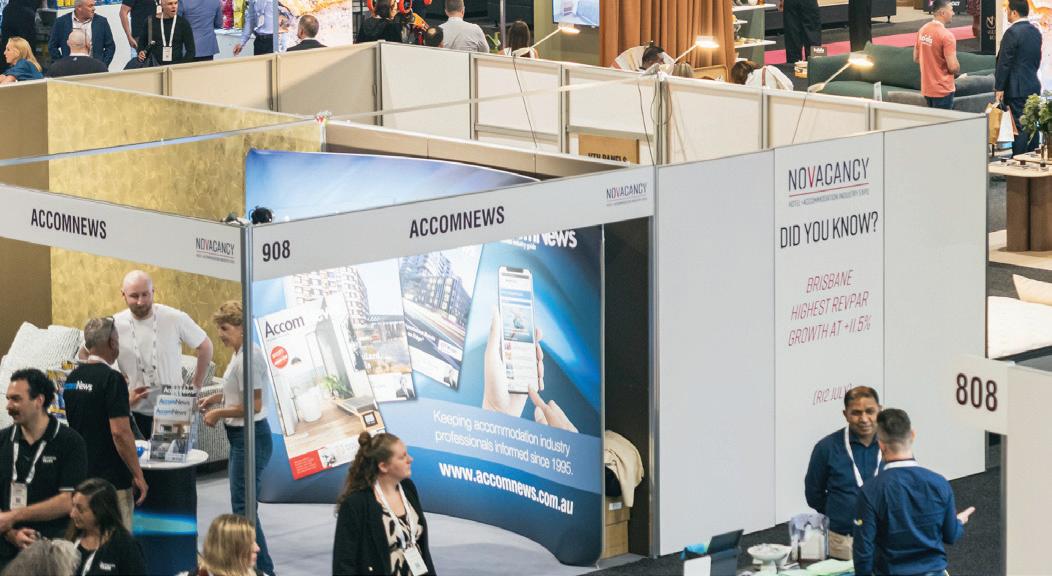
ResortBrokers marked its 40th anniversary with a double win at the Australian Resident Accommodation Managers Association (ARAMA) 2025 TOP Awards, held at The Star Brisbane on September 12. The specialist accommodation property agency was voted Sales Brokerage of the Year, while longtime Sunshine Coast agent Chenoa Daniel claimed Sales Broker of the Year—her second time receiving the honour after a 2022 win. Both awards were decided by
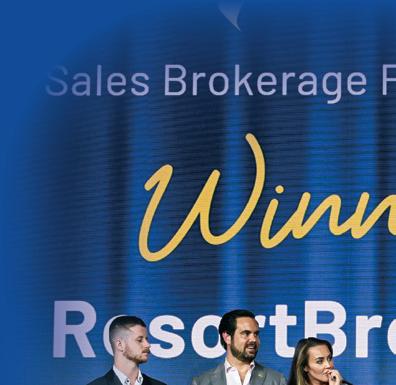

popular vote from within the management rights industry.
Since joining ResortBrokers in 2016, Ms Daniel has sett led 85 management rights transactions worth a combined $189 million. ResortBrokers, founded by Ian Crooks in 1985, now transacts more than 50 percent of management rights sales nationwide, a market share greater than all competitors combined.
Director Alex Cook said the agency is “greatly honoured to be acknowledged by ARAMA,” while Ms Daniel described her second win as “humbling and deeply meaningful.”









What a night at The Star Brisbane! The ARAMA TOP Awards once again put the spotlight on the resident managers, industry leaders and service providers who keep our communities thriving. From big wins to heartfelt moments (and many fabulous outfits), this year’s celebration was all about recognising the people who make management rights shine.
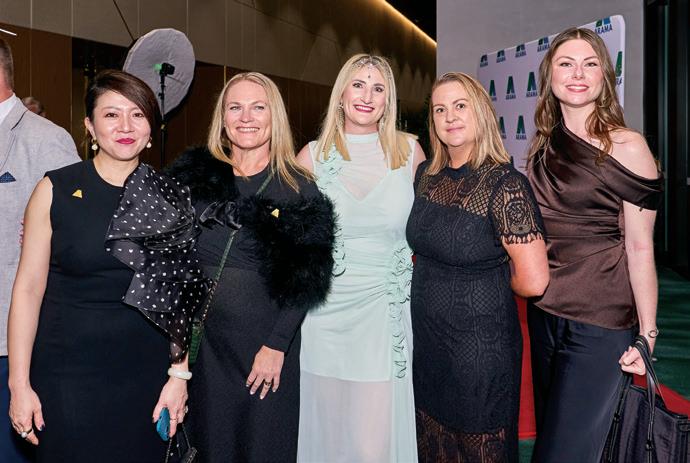




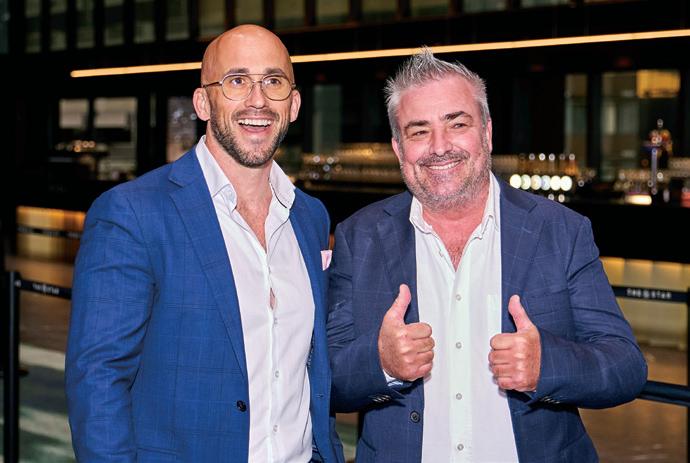































Exclusive | Student Accommodation ID: 8787
Asking Price: $1,080,000 Net Profit: $199,248
Gerard Dixon 0433 617 515


Exclusive | Permanent Strong Net Profit ID: 9157
Asking Price: $2,680,000 Net Profit: $372,171
Bill He 0439 288 960






Exclusive | Permanent Business Only ID: 9211
Asking Price: $479,000 Net Profit: $87,054
Bill He 0439 288 960


Holiday Management Rights ID: 8800
Asking Price: $8,430,000 Net Profit: $1,166,337
Phil Trimble 0418 478 966




















Take control of your business with the














SUPPORT.SALES&RENTALS. AllthebenefitsoftheConnectmodel,plus: Completesalesagentsupportincludingforms, Wecontracts,complianceandsalestrustwith marketyourpropertiesviaemailandsocials Alltoover30,000activeinvestorandownerbuyers newsletters,agentandpropertymarketing,emails, flyers,socialsandtrainingresourcestohelpattractinvestors






SeePayquarterlyviaourpaymentgateway. our website for additional benefits. $690perannum






CONFIDENCE.CONTROL.100%COMMISSION. AllthebenefitsoftheConnectmodel,plus: overWemarketyourpropertiesviaemailandsocialsto Automated30,000activeinvestorandownerbuyers brochures,DLsandsocial Ras360$299saleslistingsonRealEstate.com.au AutomatedPartnerHubaccesstoallmarketing, emailmarketingtoactivedatabaseof apartmentandtownhousebuyersandrentalseekers administrationandtrainingresources
SeePayquarterlyviaourpaymentgateway. ourwebsiteforadditionalbenefits. $1,050perannum



















Contact: Phil Trimble, 0418 478 966 phil@mrsales.com.au

Contact: Geoff Hatchman, 0427 938 444 geoff@ras360.com.au
Contact: Gavin Mattig, 0409 608 854


Contact: Scott Saunders, 0432 144 822





By Mandy Clarke, Editor
When Rob and Lesley White packed up their lives in the Snowy Mountains in the mid1980s, they were not leaving hospitality behind; they were simply changing its backdrop. After years of running ski lodges, they longed for the ocean.
Tathra, a coastal town on the New South Wales Sapphire Coast was the perfect choice, where the mountains and sea meet allowing locals and visitors to surf in the morning
For Rob and Lesley, success is not measured by awards or expansion alone. It is about the guest experience
and ski in the afternoon. It was a lifestyle that suited them perfectly and the beginning of what would become a family legacy in Australian hospitality.
At first, the Whites opened a restaurant and gallery, immersing themselves in the
community. By 1990, they were ready for something more ambitious. They developed and opened the first stage of Tathra Beach House Apartments. From the beginning, they embraced the management rights model, selling properties to investors while retaining the management, a concept then well established in Queensland
and just starting to gain traction in southern New South Wales. “It was clear to us that management rights were the future,” recalls Rob. “We loved the idea of building something that combined investment with hospitality. It gave us the opportunity to grow the business and stay connected to the people who bought into it.”

The model worked. By 2002, the business was thriving, and the Whites expanded again, adding another 20 properties and conference facilities. They sold the new apartments to investors, kept the management rights, and kept growing. In 2017, they completed a fully accessible dual-key property, carefully planned years earlier. Today, the resort off ers 28 keys across apartments, townhouses and villas, all under their management, with not a single owner ever choosing to withdraw.
“We have always looked at our business as a long-term commitment,” says Rob. “We built relationships with our owners and our guests. That is why people keep coming back and why our owners have stayed with us for more than 30 years.”
Tathra Beach House is not only the Whites’ business, it is also their home. They live onsite in a four-bedroom residence overlooking the extensive gardens to the surf. Their son Murray has returned to the
business as the operations manager, bringing fresh energy while giving Rob and Lesley more time to enjoy the lifestyle they have created.
“It is great having Murray on board,” Rob says proudly. “He
knows the property inside out and shares our passion for hospitality. It also means we can enjoy morning swims, mountain biking and even skiing in winter. Having family involved makes the business even stronger.”
The evolution of the resort mirrors the evolution of the industry itself. Rob remembers those early days fondly.












co



om a









“When we first opened, our reservation system was a big red diary sitting on the counter. Marketing was an ad in the NRMA’s Open Road magazine. That was it,” he laughs.
Now, the operation runs on Resly PMS, supported by Switch Hotel Solutions for marketing, and Room Price Genie for dynamic pricing.
“Resly is the best PMS we have
ever used,” Rob says. “We have been through different systems over the years, but nothing compares. Having the right tools is critical in this business. You have to stay ahead of the changes and adapt quickly.”
He adds that strong legal support is just as important, especially when navigating complex regulations.
“The best legal advice has been vital in helping us navigate all the hurdles the NSW Government puts in our way,” Rob says. “We’ve always appreciated the help and guidance from Col Myers and Ben Ashworth at SMH Lawyers, who drafted our caretaking and letting agreements.”
Over the years, Tathra Beach House has collected a string of accolades, including South Coast Tourism Awards, Southern NSW Tourism Awards and TripAdvisor Certificates of Excellence. For Rob and Lesley, the value lies as much in the process as in the recognition.
“Winning awards is nice, but what really matters is the chance to step back and critically analyse your business,” Rob explains. “Benchmarking ourselves against the best in the industry has helped us keep improving.”
Their reputation is also built on consistency. Guests frequently praise the friendly
staff, immaculate presentation, attention to detail and unbeatable location opposite the surf. Many families return year after year, now spanning generations. “We have guests who stayed with us as children who are now bringing their own kids,” says Rob.
“Some even remind us of the days when their children played cricket in the driveway with our boys. Those kinds of memories are priceless, and they show what hospitality is really about.”
Tathra Beach House was featured in one of the early editions of Resort News, and Rob has been a loyal subscriber to the magazine throughout his career.
“I have been reading Resort News for decades,” he says. “It has always been a valuable resource to stay connected with the industry and to see how others approach the challenges we all face. It is also rewarding to see our own story told and shared with our peers.”
Unlike Queensland, where management rights are deeply entrenched, New South Wales has a more complex and less supportive regulatory environment. Rob is candid about the challenges.
“There is no reason why management rights cannot thrive in NSW the same way it has in Queensland,” he says.
“Before 2020 our businesses were growing strongly. Then Fair Trading changed the rules and required Class 1 real estate licences to run accommodation management. It is a completely diff erent skill set. Hospitality professionals had no interest in studying irrelevant real estate subjects and real estate agents had no interest in buying into our businesses. It was a huge setback.”
Rob and Lesley make a point of attending the NoVacancy Expo in Sydney most years, which Rob calls “a fantastic event with great opportunities to get on top of the latest industry trends.”
“Walking around the event, we see thousands of young accommodation professionals with the right skills to run our businesses exceptionally well,” he says.
“It’s sad that so few will, because the NSW Government mandates that only real estate agents can run our businesses.”
Despite these frustrations, Rob remains optimistic. “If we can find sensible solutions to the licensing issue, I believe there is a bright future for management rights in NSW. The model works. It just needs the right people to be allowed to run it.”
Beyond the business, the Whites are deeply involved in the Tathra community. They collaborate with the local chamber of commerce, refer guests to local restaurants, shops and att ractions, and have partnered with the Tathra Hotel and Tathra Beach Eco Park on destination marketing campaigns.
“Working together is good for everyone,” says Rob. “We want our guests to enjoy the whole

destination, not just our resort.”
Living on the Sapphire Coast off ers plenty of lifestyle rewards. Rob and Lesley enjoy swimming, mountain biking, skiing, and even fl ying. Rob, a recreational pilot, delights in spott ing whales along the coast from the air.
“This is one of the best places in the world to live,” he says. “We have the beaches, the mountains, great weather and a welcoming community. It has everything.”
The resort is currently undergoing a refurbishment of its Ocean View Spa apartments, with upgrades to other room types planned over the coming years. The Whites are also finalising plans for a sister property in nearby Bega, designed to meet demand for high-end corporate accommodation.
“We are lucky to have supportive owners who are willing to reinvest,” Rob says. “Keeping the property fresh is important. Guests notice the details, and we want them to leave feeling relaxed and cared for.”
For Rob and Lesley, success is not measured by awards or expansion alone. It is about the guest experience.
“There is nothing more satisfying than farewelling a
guest who checked in tired and stressed and seeing them leave happy and relaxed,” Rob says with a smile. “When that happens, we know we have done our job well.”
After more than 30 years, Tathra Beach House Apartments
stands as proof that with passion, commitment and community connection, hospitality can thrive in even the most challenging environments. For the Whites, it has been a lifelong journey from mountains to sea, and one they would not trade for anything.





























































































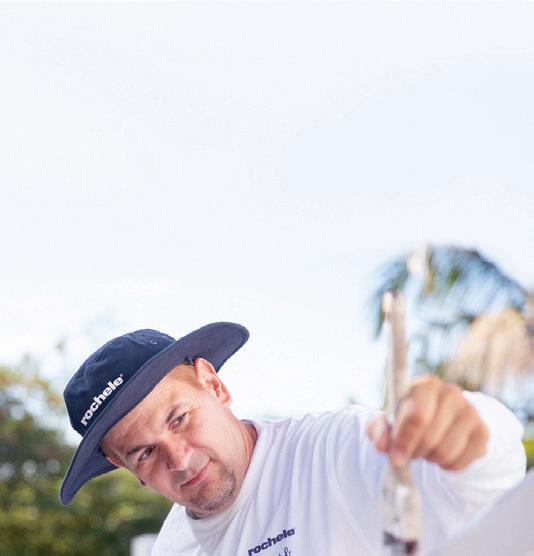


• Buying and Selling
• Off-the-plan Procurements
• Assignments









• Preparing/Negotiating Agreements
• Varying Agreements incl. Top-ups
• Unlinking Manager’s Lot
• Dealing with RANs
We work across all areas of Management Rights law including: Visit our website for webinars, resources and information to help you navigate the management rights maze! strata.redchip.com.au



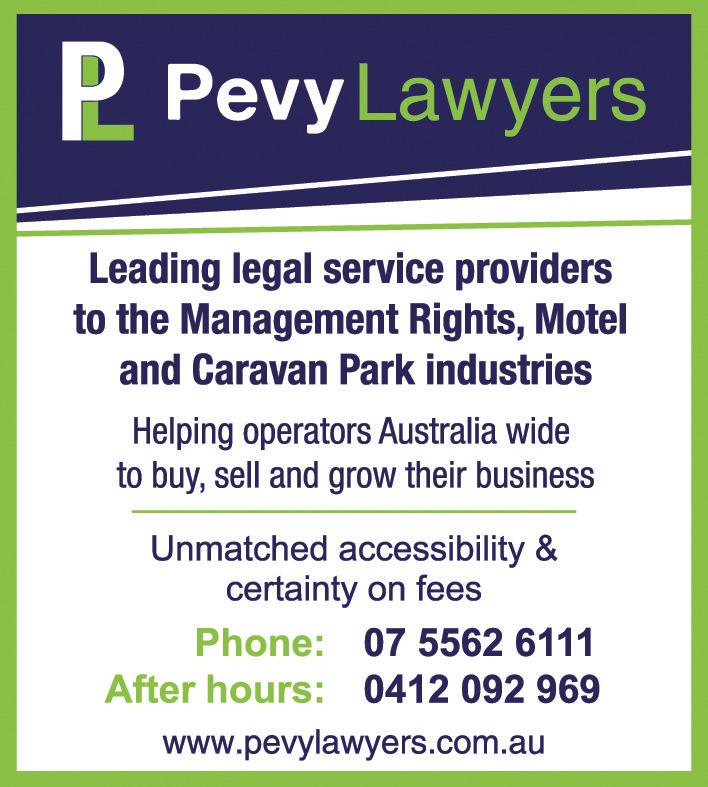

























One of the Gold Coast’s longest established law firms
More practice areas than any other firm in our region
QLD Law Society accredited specialist lawyers
Multi-generation clients – loyal support for more than a lifetime
• Acting on the sale and purchase of management rights for caretaker/letting agents Australia wide.
• Advice on all matters relating to the set-up of management rights in new or existing complexes.
• Assisting management rights operators to secure tenure on their management rights agreements.
• Variations of management rights agreements, including decoupling and subdivision of lots.
• Termination and surrender of management rights agreements.
• The ability to assist management rights operators to interpret and understand legislation and the protection of their rights.
Kelsey Huebner | Partner (Non-Principal)
Phone: 07 5539 9688 / 0400 045 498




Address: Shop 5003, Level 1, Robina Town Centre Robina QLD 4226 Level 10, 95 North Quay, Brisbane QLD 4000
Email: kelsey.huebner@mba-lawyers.com.au Website: mba-lawyers.com.au


